- Nos voyages
- Astuces & bons plans
- Hajj & Omra
- Qui sommes-nous ?


Doit-on jeûner en voyage ?
Doit-on jeûner en voyage .
À l’approche du mois de ramadan , nous sommes nombreux à nous interroger sur le statut du jeûne ( صيام ) en voyage. Faut-il jeûner en voyage ? Est-il autorisé en islam de rompre son jeûne en voyage ? À quel moment peut-on rompre son jeûne ? Qu’il soit surérogatoire ou obligatoire, le jeûne, est sujet à beaucoup d’interrogations de la part des voyageurs musulmans. Dans cet article, nous allons tenter de répondre à certaines de ces questions.
Allah a autorisé de rompre le jeûne en voyage
Dans le Coran, Allah à permis de rompre le jeûne quand on est en voyage.
“Donc, quiconque d’entre vous est malade, ou en voyage, alors, il jeune un nombre égal d’autres jours”. (Coran: 2:185)
Dans ce passage du Coran, Allah nous informe que le jeûne du mois de ramadan est une obligation pour tous les croyants si et seulement si nous sommes en mesure de le supporter physiquement. Par ailleurs, ce verset introduit une dispense de jeûne pour les personnes malades ou les voyageurs. Ces derniers devront rattraper les jours manqués lorsqu’ils seront guéris ou lorsqu’ils ne seront plus en voyage.
C’est une permission claire venant de la part d’Allah dans le Coran.
Évidemment, l’ensemble des musulmans a connaissance de ces versets. Mais alors, pourquoi, la question revient-elle sur le tapis tous les ans pendant le ramadan ? Continuez la lecture, on vous explique tout ça 😉
Le jeûne du mois de ramadan étant un pilier de l’islam, il ne peut pas être pris à la légère. Les voyageurs musulmans, par la facilité qu’ils ont, de nos jours, à se déplacer, mais aussi parce que voyager est aujourd’hui davantage un loisir qu’une obligation , s’interrogent sur ce qui est préférable.
Plusieurs questions se posent à savoir :
- Qu’est-ce qui est préférable ?
- Rompre le jeûne en voyage ou continuer à jeûner ?
- Est-il préférable de poursuivre son jeûne en voyage ?
Cette question a été posée aux savants de l’islam (qu’Allah soit satisfait d’eux). Elle est sujette à de nombreuses divergences depuis des siècles… Certains savants affirment qu’il est préférable de jeûner pendant un voyage et d’autres estiment que les voyageurs musulmans doivent rompre leur jeûne . Comme pour toutes les divergences entre les « gens de science », nous devons respecter les avis et preuves de chacun.
Dans les écoles de l’imam Malik (madhab Malikite), de l’imam Muhammad Ibn Idris Ash-Shafi’i (madhab Shafi3ite) et l’imam Ahmad Ibn Hanbal (madhab Hanbalite) entre autres, il est préférable de continuer de jeûner lorsque l’on est en voyage.
Bien entendu, tous les savants de ces écoles juridiques ont apporté des preuves pour soutenir leurs avis. Ces avis sont tous fondés sur des preuves tirées du Coran et de la Sunna que nous ne développerons pas ici.
En revanche, l’écrasante majorité des savants, est d’avis qu’il est préférable de ne pas rompre son jeûne en voyage . Une des preuves apportée pour cet avis est le verset du Coran dans lequel Allah dit :
“Et de jeûner, est meilleur pour vous” sourate Al Baqara
C’est le même passage au sein duquel Allah autorise de rompre le jeûne en voyage.
Bien que la majorité des savants des principales écoles juridiques disent qu’il est préférable de continuer de jeûner en voyage, ajoutons quand même qu’ils recommandent vivement de rompre le jeûne si ce dernier venait à devenir pénible pour le voyageur. Si jeûner en voyage est éprouvant, insupportable et risque de mettre en péril votre santé physique alors vous devez cesser de jeûner et rattraper par la suite.
À ce sujet, justement, Anas (qu’Allah l’agrée) rapporte : ” Nous avons voyagé avec le prophète (paix et bénédiction sur lui) pendant le mois du ramadan. Pendant ce voyage, le jeûneur ne reprochait rien à ceux qui ne jeûnait pas. Et vice-versa “.
À travers ce Hadith, on voit à quel point les compagnons du prophète ﷺ se respectaient.
En conclusion, nous pouvons dire que la personne qui éprouve une facilité quant au fait de ne pas rompre son jeune en voyage, alors qu’il continue son jeune.
Quant à celui qui éprouve des difficultés quant au fait de continuer à jeûner alors qu’il rompe son jeûne.
Quand peut-on rompre le jeûne en voyage ?
À partir du moment où il est autorisé de réduire les prières alors on peut considérer qu’il est aussi autorisé de rompre son jeûne. Et s’il n’est plus autorisé de réduire les prières alors il n’est plus autorisé aussi de rompre le jeune.
- À quel moment ?
- À quelle distance ?
- À quelle période ?
Nous vous détaillerons dans un prochain article, toutes les explications sur la permission de raccourcir les prières en voyage.
Pour être considéré voyageur, on doit :
- Mettre l’intention de quitter son domicile
- Quitter son domicile avant le fajr (n’oubliez pas de réciter les invocations du voyageur 😉 )
- Sortir de la ville dans laquelle on réside
- Dépasser les 81 kms (environ)
- Rester moins de 4 jours complets dans le lieu où nous voyageons
En revanche, si le muslim traveler dépasse les 4 journées, il ne peut plus rompre son jeûne, car il n’est plus considéré comme étant voyageur.
Une condition s’ajoute à ce que nous venons dire plus haut et cette condition est majoritaire au sein des gens de science :
En revanche, si la journée à débuté alors qu’elle était en voyage alors il lui est autorisé de rompre le jeûne. Cet avis s’appuie sur l’école de l’imam Malik
Voilà nos chers muslims voyageurs, on espère avoir apporté un petit éclaircissement à propos du jeûne en voyage. N’hésitez pas à nous faire part de vos commentaires.
Allah est le plus savant ♥
Tout savoir sur le jeûne du voyageur
Pour approfondir la question du jeûne en voyage , procurez-vous l’un de ces ouvrages sur Amazon.
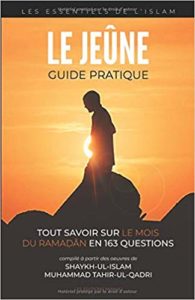
J’achète ce livre

Articles similaires

Une femme peut-elle voyager sans mahram ?
On rêve toutes de voyages halal ! Pas vrai ? Oui, mais notre belle religion nous donne un cadre à respecter afin que nos voyages se déroulent dans les meilleures conditions possibles. C’est pourquoi, nous tentons dans cet article de répondre à la question du voyage d’une femme sans mahram.

Comment accomplir la prière du voyageur ?
Dieu a permis aux voyageurs musulmans de raccourcir et de regrouper les prières lorsqu’ils voyagent. C’est pourquoi dans cet article, nous t’expliquons comment accomplir la prière du voyageur. Quelle distance faut-il respecter avant de faire la prière du voyageur ? Comment raccourcir les prières ? Quelles prières faut-il regrouper ? Tu trouveras toutes les réponses à tes questions dans cet article inch’Allah.
Laisser un commentaire Annuler la réponse
Search engine.
Don't show this popup again
Privacy Overview
- fr العربية ar English en Español es Français fr हिन्दी hi Indonesian id Türkçe tr Uygur ug اردو ur
Qu’est-ce qui est préférable pour celui qui voyage en Ramadan : jeûner ou s’en abstenir ?
Date de publication : 17-11-2002
Vues : 99117
Qu’est-ce qui estpréférable pour celui qui voyage pendant le Ramadan : observer le jeûne ou ne pas l’observer ?
Texte de la réponse
Louange à Allah.
Les quatres imams, la majorité des Compagnons et leurs successurs immédiats soutiennent qu’il est permis au voyageur de jeûner et que s’il le fait son jeûne est valide. Voir l’Encyclopédie juridique, tome 28, p. 73.
S’agissant de ce qui est préférable, voici quelques cas détaillés :
Le premier cas :
Il s’agit de l’égalité de l’observance et de l’inobservance du jeûne. C’est le cas dans lequel l’observance du jeûne n’a aucune influence négative sur le jeûneur. Dans ce cas, il est préférable d’observer le jeûne pour les arguments suivants :
a)Abou Darda dit : Nous sortimes en compagnie du Messager d’Allah au cours du mois de Ramadan, à un moment où il régnait une chaleur si intense que l’un de nous se mettait la main sur la tête pour se protéger.Aucun de nous n’observait le jeûne hormis le Messager d’Allah (bénédiction et salut soient sur lui) et Abd Allah ibn Rawaha. (Rapporté par al-Boukhari, 1945 et par Mouslim, 1122).
a) Jeûner constitue un acquittement immédiat du devoir.
Le rattrapage peut se retarder. C’est pourquoi il vaut mieux jeûner à
b) Jeûner immédiatement est souvent plus facile pour les concernés. Car il est plus commode que de recommencer (après les autres).
d) Jeûner immédiatement permet de profiter du temps précieux que constitue le Ramadan. Celui-ci est meilleur que les autres mois et il demeure le cadre normal du jeûne obligatoire.
C’est pour tenir compte de ces arguments que l’on a jugé plausible l’avis de chaffi (Puisse Allah lui accorder Sa miséricorde) selon lequel le jeûne est préférahble pour celui trouve l’observance et l’inobservance du jeûne égale.
Le deuxième cas :
C’est le cas de celui qui trouve la non observance du jeûne plus clément. Nous disons à celui-là qu’il est préférable pour lui de ne pas jeûner. S’il trouve le jeûne pénible, son observance par lui est alors réprouvée. Car se donner la peine de jeûner en dépit de l’existence d’une dispense revient à croire pouvoir se passer de la dispense accordée par Allah le Puisant et Majestueux.
Le troixième cas :
C’est celui du voyageur auquel le jeûne provoquerait une peine insupportable. Pour celui-là, le jeûne est prohibé.
Cet avis s’appuie sur un hadith rapporté par Mouslim d’après Djabir ibn abd Allah (P.A.A.). Selon ce hadith, le Messager d’Allah (bénédiction et salut soient sur lui) partit pour la Mecque en Ramadan lors de l’année de la conquête. Il observa le jeûne jusqu’à son arrivée à Kuraa al-Cohamim. Les gens jeûnèrent comme lui. Et puis il demanda une coupe remplie d’eau, la leva de sorte à la montrer au gens, et en but.. Plus tard, on lui dit que certains (de ses compagnons) avaient maintenu leur jeûne. Ce qui lui fit dire : Voilà des désobéissants, Voilà des désobéssants ! Selon une version, «On lui dit : les gens trouvent le jeûne pénible et s’en remettent à vous. C’est alors qu’il fit venir une coupe après la prière d’Asr (1114). Il qualifia de désobéissants ceux qui avaient maintienu leur jeûne malgré la grande souffrance qu’ils ressentaient. Voir ach- charh al-mumti ’ par Cheikh Muhammad ibn Outhaymine (Puisse Allah lui accorder sa miséricorde) tome 6, p.355).
An- Nawawi et al-Kamal ibn al-Hoummam ont dit : « les hadiths qui indiquent que la non observance du jeûne est préférable pour le voyageur concernent celui auquel le jeûne porte préjudice.
Certains hadith le précisent clairement. Cette interprétation s’impose pour reconcilier les hadiths. Cette démarche est meilleure que celle qui consiste à en annuler certains ou à prétendre leur abrogation sans une peuve formelle. Ceux qui ont jugé l’observance et la non observance du jeûne égales tirent leur argument d’un hadith d’Aïcha (PA.A.) selon lequel Hamza ibn Amr al-Aslami (P.A.A) a dit au Prophète (bénédiction et salut soient sur lui) : « Devrais-je observer le jeûne quand je voyage –l’auteur de la question jeûnait fréquemment– ? tu peux jeûner ou t’en abstenir, si tu veux Lui dit le Prophète (cité dans les Deux Sahih.
Source: L’Encyclopédie juridique, tome 28, p. 73
Partager Question
Enregistrer l’entrée créer un compte.
courrier électronique
mot de passe
8 caractères au minimum avec au minimum une lettre minuscule et une lettre majuscule en caractère latin
entrer créer un compte
vous ne pouvez pas accéder à votre compte?
si vous n’avez pas de compte , cliquez sur le bouton ci-dessus pour créer votre compte
si vous avez un compte allez à enregistrer l’entrée
création d’un nouveau compte enregistrer l’entrée
redéfinir un mot de passe
Voyager pendant le ramadan : ce qu’il faut savoir
Le ramadan est le mois le plus sacré du calendrier islamique et est synonyme de changements pour les fidèles, mais aussi pour les touristes souhaitant se rendre dans des régions du monde à majorité musulmane. comment adapter son séjour en conséquence .

Si vous comptez voyager dans un pays musulman pendant le ramadan, il vous faudra respecter certaines règles supplémentaires. Nous vous aidons à vous y retrouver.
Pour les musulmans, le ramadan correspond au mois où Allah s’est pour la première fois adressé au prophète Mahomet, où la communauté musulmane a remporté sa toute première bataille, et où Mahomet est revenu triomphant à La Mecque en 630 de notre ère.
Au cours du ramadan, les musulmans observent une abstinence pieuse pendant la journée en jeûnant du lever au coucher du soleil, et s’adonnent à un culte fervent pendant la nuit. De nombreux pays à majorité musulmane adaptent donc leurs normes sociétales en conséquence. Ainsi, à quoi s’attendre en tant que touriste dans une région à majorité musulmane lors du ramadan ? Voici les réponses aux principales questions des voyageurs.
COMMENT SAVOIR QUAND COMMENCE LE RAMADAN ?
Chaque année, le ramadan tombe à une date différente dans le calendrier grégorien. En effet, le calendrier islamique, ou calendrier hégirien, suit le cycle de la Lune, et la date du début du ramadan n’est confirmée que la veille au soir, une fois que la nouvelle Lune a été aperçue. Même dans ce cas, les musulmans commencent et terminent souvent le ramadan à des dates légèrement différentes en fonction des spécificités régionales. Par exemple, si de nombreux pays musulmans sunnites suivent l’annonce de l’Arabie saoudite, d’autres décident du début du ramadan selon leurs propres observations, il est donc important de vérifier les dates locales dans le cas où vous souhaiteriez éviter la période du ramadan ou au contraire en faire l’expérience.
POURRAI-JE MANGER EN PUBLIC PENDANT LA JOURNÉE ?
Tout dépend de la région dans laquelle vous vous rendrez. S’il s’agit d’un pays musulman dont la communauté est mixte d’un point de vue religieux, comme Sarajevo en Bosnie, ou d’un lieu habitué à accueillir des touristes non musulmans tout au long de l’année, comme Charm el-Cheikh en Égypte, alors oui, cela ne pose pas de problème. Toutefois, si vous voyagez dans des communautés à majorité musulmane non mixtes ou qui ne sont pas habituées aux touristes, il est préférable de manger et de boire à l’abri des regards pendant la journée.
POURRAI-JE CONSOMMER DE L’ALCOOL OU MÊME DES BOISSONS NON ALCOOLISÉES ?
Dans les régions mixtes ou habituées à accueillir des touristes non musulmans, les bars seront probablement ouverts et fonctionneront comme à l’habitude. Dans les régions majoritairement musulmanes ou peu habituées aux touristes, comme la province à majorité musulmane de Pattani, dans le sud de la Thaïlande, il est peu probable que vous puissiez vous procurer de l’alcool. En revanche, si tel est le cas, il est conseillé, par respect pour les us et coutumes locaux, de consommer de l'alcool à l’abri des regards.

De nombreuses destinations à majorité musulmane, comme Le Caire en Égypte, adaptent leurs normes sociétales pendant le ramadan, ou mois sacré.
TOUS LES MUSULMANS OBSERVENT-ILS LE JEÛNE ?
Bien que le jeûne soit une obligation pour tout musulman adulte, les personnes malades, enceintes, allaitantes, en période de règles ou qui voyagent, n’ont pas l’obligation de jeûner. Les jours de jeûne manqués peuvent être compensés, soit en jeûnant, soit en faisant des dons appelés Fidya et Kaffarah. Même les musulmans n'observant pas le jeûne respecteront les régions où tout le monde semble jeûner en s’abstenant de manger ou de boire à l’extérieur en journée.
FAUDRA-T-IL S’HABILLER DIFFÉREMMENT ?
Vous devez porter ce que vous pensez devoir porter dans votre pays de destination d’après vos recherches, car les musulmans n’adoptent pas de changements vestimentaires spécifiques lors du ramadan. Toutefois, certains peuvent choisir de s’habiller plus sobrement en raison de l’esprit pieux qu’ils adopteront au cours du mois.
LES ATTRACTIONS TOURISTIQUES, LES MAGASINS ET LES RESTAURANTS SERONT-ILS OUVERTS ?
Les villes à majorité musulmane modifieront sensiblement les heures d’ouverture de la plupart des commerces pendant le ramadan. Toutefois, l’ouverture des commerces dépend en grande partie du type de région musulmane où vous vous rendez. Par exemple, en Tunisie, pays à majorité musulmane, une ville très sainte comme Kairouan, moins visitée par les touristes, semblera plus endormie et plus lente pendant la journée, la plupart des commerces locaux ouvrant et fermant beaucoup plus tard que d’habitude (s’ils restent bel et bien ouverts). En revanche, rien ne changera pour les voyageurs qui se rendront à Sidi Bou Saïd, haut lieu du tourisme tunisien, pendant le ramadan.
les plus populaires

Pendant le ramadan, l’ iftar est le repas qui rompt le jeûne après le coucher du soleil. Il s’agit généralement d’un grand festin familial composé de plusieurs plats à partager.
SERAI-JE AUTORISÉ À VISITER DES LIEUX SACRÉS PENDANT LE RAMADAN ?
Une fois le soleil couché, les lieux de culte seront extrêmement fréquentés pendant le ramadan, et ce jusqu’au petit matin. Dans les endroits multiconfessionnels et touristiques, il vous sera peut-être possible de participer gratuitement à un iftar , le repas de coupure du jeûne, dans une grande mosquée. Autrement, le moment idéal pour visiter les lieux de culte se situera entre les prières du Dohr (zénith) et de l ’Asr (milieu de l’après-midi). En effet, les gardiens de ces lieux se reposent en début de journée après les longues prières de la nuit précédente. Cela dit, il se peut que plusieurs grandes mosquées et lieux de culte dans les villes touristiques, comme Istanbul, soient ouverts en début de journée.
EXISTE-T-IL DES DIFFÉRENCES RÉGIONALES ?
Chaque région propose ses propres plats de ramadan, qu’il s’agisse de jalebis extrêmement sucrées dans le sous-continent indien, de délicieuses mercimek çorbası (soupe de lentilles) en Anatolie ou de kosharis consistants en Égypte. En Bosnie, de nombreuses grandes mosquées organisent en journée des récitations du Coran en direct pour les fidèles, tandis qu’en Malaisie, les hôtels proposent d’alléchants buffets d’ iftar. En Algérie, vous entendrez de la musique traditionnelle chaâbi et malouf s’échapper des théâtres locaux qui proposent des concerts de fin de soirée pour le ramadan.
QUELLE EST LA MEILLEURE FAÇON DE FAIRE L'EXPÉRIENCE DU RAMADAN EN TANT QUE TOURISTE ?
Si vous avez l’intention de vous rendre dans une région du monde à majorité musulmane pendant le ramadan, adaptez-vous au rythme de vie de ses habitants. Dormez en début de journée et veillez tard dans la nuit, pour profiter de l’atmosphère festive des centres-villes et des alentours des grandes mosquées, avant de déguster les délicieuses spécialités du ramadan et de sortir pour suivre une finale de coupe locale dans un quartier animé de Djeddah, ou pour assister à un concert à Constantine.
Cet article a initialement paru sur le site nationalgeographic.com en langue anglaise.
- Arabie saoudite
- Civilisation islamique
- Iran (République islamique d')
- Moyen-Orient
- Territoires palestiniens occupés
- Tourisme culturel
- Tourisme religieux
- Émirats arabes unis
- Peuple et culture
- Voyages et aventures

- Horaire Prière
- Calendrier Musulman
- Lire le Coran
- Sermon du Vendredi
- Le Pèlerinage
- Invocations

Est-ce une bonne idée de voyager dans un pays musulman pendant le ramadan ?
- Lire dans l’app
- Copier le lien Lien copié
DÉCRYPTAGE - Ce 11 mars commence le mois de ramadan, une période de jeûne et de prière pour les musulmans du monde entier. Entre promotions hôtelières, floraison d'événements culturels et gastronomiques, voyager en terre d'Islam pendant le ramadan devient de plus en plus une bonne idée.
Qu'il semble loin le temps où ce neuvième mois de l'année de l'hégire se traduisait par une baisse significative des flux touristiques en terre d'Islam, quand seuls s'y aventuraient les voyageurs assez flexibles pour s'accommoder d'une raréfaction des lieux de restauration pendant la journée, et d'horaires et prestations à géométrie variable. Aujourd'hui « voyager pendant le ramadan devient de plus en plus un non-événement », estime Bruce McNamara, directeur de production de Beachcomber Tours, spécialiste notamment des voyages vers les Émirats arabes unis, Oman , la Jordanie ou le Maroc.
Allègement des contraintes
« La plupart des pays ont fait des efforts pour concilier les exigences de la religion et les besoins du tourisme, en particulier les Émirats arabes unis », ce qui se traduit par un allégement des contraintes pour les non-musulmans. À Dubaï comme à Abu Dhabi , fini les rideaux occultant la consommation de nourriture et de boissons pendant la journée : la plupart des restaurants restent désormais ouverts dans les conditions habituelles pendant le mois sacré. Et Marrakech où s'attabler au soleil durant le ramadan hors des hôtels clubs était un véritable défi il y a quelques années, regorge aujourd'hui de lieux où déjeuner, boire un café, siroter un apéritif ou danser sous les étoiles à la nuit tombée.
Faire preuve de souplesse
Si elle se distingue de moins en moins, cette période qui coïncide cette année encore avec la haute saison touristique autour de Pâques implique tout de même quelques changements nécessitant des efforts d'adaptation . Ne pas boire, manger ou fumer dans les lieux publics pendant la journée et arborer des tenues vestimentaires « bienséantes » par respect pour ses hôtes font partie des réflexes élémentaires à adopter.
Tout comme la bienveillance à l'égard des désagréments possibles (embouteillages notamment avant la rupture du jeûne, lenteur du service, fermeture précoce des boutiques et musées l'après-midi, et des restaurants ou cafés dans les zones peu touristiques, horaires décalés pour les excursions, etc.). « Il faut savoir faire preuve de souplesse, la réactivité du service n'est parfois pas la même. S'il y a rupture du jeûne au moment du repas des touristes par exemple, il peut se produire un moment de flottement , remarque Raouf Benslimane président d'Ô Voyages. Mais les prestations ne sont pas affectées, nos questionnaires de satisfaction réalisés chaque mois n'ont jamais démontré de pic de mécontentement pendant le ramadan ».
S'initier à la culture et à la gastronomie
Si ce n'est pas une mauvaise idée de voyager dans un pays musulman pendant le ramadan, est-ce pour autant une bonne idée ? « C'est une très bonne période pour voyager avec des offres spéciales dans l'hôtellerie », note Adeline Kurban Fiani, DG du groupe KTS France et du TO Aya Désirs d'Orient / Aya Désirs du Monde, les rabais minimum pouvant atteindre 25%. S'y ajoute dans certains pays comme la Jordanie, une moindre fréquentation des sites culturels.
Au-delà, le ramadan est aussi une période de réjouissances, et un moment privilégié pour découvrir les coutumes du pays hôte. Pour cela, un impératif, vivre à l'heure des habitants autrement dit la nuit quand les rues s'illuminent ! Aux Émirats arabes unis , les offices de tourisme n'hésitent plus à mettre en avant les occasions de découvertes autour de la culture. Iftars (repas de rupture du jeûne) ou suhur (repas avant l'aube) gargantuesques à l'ombre de tentes festives dressées dans les rues ou dans les hôtels, street food tours autour des plats emblématiques du ramadan comme le thareed (ragoût de viande et légumes), lectures de poésie gourmandes dans le quartier arty d'Al Serkal Avenue à Dubaï, ou tournois de jeux dans l'écrin muséal de Manarat Al Saadiyat à Abu Dahbi…
Autant d'expériences permettant de participer à la liesse générale et de découvrir « les à-côtés joyeux de ce rite religieux qui n'a rien de strict comme on pourrait le penser », note Raouf Benslimane pour qui les restrictions sont « largement compensées par les festivités populaires ». Au Maroc , la gastronomie est plus que jamais de la partie, avec des buffets raffinés dans les hôtels et il n'est pas rare d'être invité dans les familles pour la cérémonie du ftour , longue succession de délices, de la harira, soupe servie avec des dattes, aux tajines longuement mijotés. Une expérience culinaire unique, et surtout un moment authentique de partage !
À lire aussi Ramadan : les bons comportements à adopter quand on est touriste dans un pays musulman
- Casablanca lifestyle : nos meilleures adresses dans la ville marocaine, laboratoire de styles
- Les 10 meilleurs hôtels de Marrakech
- Les 10 meilleurs riads et hôtels à Fès, cité millénaire et impériale
Partager via :
Plus d'options
LIBRE ET HEUREUX
le 08/03/2024 à 12:16
Avant d'être musulman un pays doit avoir envie d'accueillir des touristes Ui eux doivent être respectueux des traditions locales, même chose pour les pays avec d'autres religions. Les touristes doivent respecter les habitants locaux, ne pas se croire tout permis et être respectueux des lieux visités.
LISIANTHUS83
le 07/03/2024 à 16:34
Certainement pas !
le 07/03/2024 à 14:31
Très mauvaise idée ,j' ai encadré un groupe de touristes en Tunisie,en plein été ,dans le désert ,pendant le Ramadan ,le guide ne pouvait pas boire ni manger ,imaginez son état!
On pourra la visiter mi-mai : dans les pas de Marcel Proust, la maison de Tante Léonie rouvre à Illiers-Combray
REPORTAGE - Après deux années de travaux, la maison de Tante Léonie, à Illiers-Combray, qui ouvrira au public mi-mai, donne au tourisme proustien un lieu muséal digne de l'illustre auteur de la Recherche .
De Bréhat à Groix, les plus belles îles de Bretagne à visiter
Tropicales ou luxuriantes, sauvages ou paisibles, ces îles bretonnes sont idéales pour une robinsonnade estivale de quelques jours ou plus.
Randonnée en famille dans les Fiz, les «Dolomites du Haut-Giffre» qui font face au mont Blanc
Relativement méconnue, la chaîne des Fiz dresse ses falaises de 600 mètres de haut face au toit de l'Europe. En point d'orgue : le magnifique désert de Platé. À découvrir l'été en famille, pour en prendre plein les yeux.
- Résultats des élections
- Guerre en Ukraine
- Tension Iran-Etats Unis
- Corée-Du-Nord
- Actualité politique en temps réel
- Analyses, débats politiques et sociétaux
- Actualité et réseaux sociaux
- Programme TV en ce moment
- Programme TV TNT
- Séries Netflix, HBO, OCS et TV
- Election et photos Miss France 2024
- Programme TV Canalsat
- Programme TV Free
- Programme TV SFR
- Actu people
- Calendriers et résultats des matchs en direct
- Jeux olympiques
- Actualité cyclisme
- Résultats, classement général Tour de France
- Classement Ligue 1
- Classement Top 14
- Transferts football
- Coupe du monde de football
- Ballon d'Or France Football
- Horoscope du jour
- Guide du mariage
- Recettes de cuisine
- Brigitte Macron
- Apéritif dînatoire
- Recette pâte à crêpe
- Tendance bijoux
- Meghan Markle
- Gainer son corps
- Fiches et guides des médicaments
- Astuces et conseils bien-être
- Santé et sexualité
- Index des maladies
- Conseils alimentation, nutrition et santé
- L'encyclopédie des organes
- Conseils en psychologie
- La pollution va t-elle nous tuer ?
- Apnée du sommeil : Comment mieux dormir ?
- 15 mythes sur les vertus des aliments
- Guide d'achat maison et jardin
- Guide d'achat santé et beauté
- Guide d’achat high-tech
- Guide d'achat smartphones et tablettes
- Comment choisir le meilleur extracteur de jus ?
- Quelle est la meilleure montre connectée ?
- Quel est le meilleur home cinéma sans fil ?
- Comparatif semelle gel
- Quel épilateur électrique choisir ?
- Meilleurs VPN de 2023
- Résultats Bac
- Révisions du Bac
- Annuaire des écoles de commerce
- Les entreprises qui recrutent
- Trouver un stage
- Résultats Brevet des collèges
- Classement des écoles de commerce
- Trouver une alternance
- Agenda étudiant : JPO, salons…
- Succession de Johnny Hallyday
- Sorties cinéma
- Guide arts et expositions
- Actualité musicale
- Actualité jeux-vidéo
- Citations et proverbes
- Réservation de spectacles et théâtre
- Sortir à Paris
- Histoire de France
- Langue française
- Code promo Wish
- Code promo Cdiscount
- Code promo SheIn
- Code promo eBay
- Code promo AliExpess
- Code promo Deliveroo
- Code promo Nike
- Code promo Sephora
- Code promo Showroomprive
- Code promo Asos
- Toutes les offres d'emploi
- Emploi à Paris
- Emploi à Lyon
- Emploi à Toulouse
- Emploi à Nantes
- Emploi à Bordeaux
- Emploi commercial
- Emploi contrôleur de gestion
- Emploi logistique
- Emploi communication
- Nos fiches métiers
- Annonces immobilières
- Achat appartement Paris
- Achat appartement Nice
- Achat appartement Cannes
- Achat appartement Bordeaux
- Achat appartement Lyon
- Achat appartement Aix-en-provence
- Achat maison Bordeaux
- Achat maison Marseille
- Achat maison Montpellier
- Simulateur de seuil de richesse
- Actualité économique et analyses
- Impôts sur le revenu : simulateur
- Palmarès des villes où investir dans l'immobilier
- Studios et 2-pièces : les loyers ville par ville
- Calculer l'impôt à payer
- Barême des droits de succession et donation
- Indice de référence des loyers (IRL)
- En France, les hauts revenus sont-ils tous des «riches»?
- Carte familles nombreuses : jusqu’à 75 % de réduction sur les billets de train
- Guide des croisières
- Guide voyage Jordanie
- Guide voyage Namibie
- Guide voyage Maroc
- Guide voyage New York
- Guide voyage Birmanie
- Guide voyage Lille
- Guide voyage Antilles
- Guide voyage Japon
- Guide voyage Amsterdam
- Le Figaro Magazine
- Madame Figaro
- Le Figaro Hors-Série
- Le Figaro Histoire
- TV Magazine
- F, l'art de vivre
- TV, home cinéma et vidéo
- Sport et mobilité
- Santé et beauté
- Maison, jardin et bricolage
- High tech et informatique
- Jeux vidéo et consoles
- Smartphones et tablettes
- Casques, enceintes et platines
- Comprendre le vin
- Tops et sélections
- Domaines et vignerons
- Economie du vin
- Foire aux vins
- Magazine du vin
- Cocktails et mixologie
- Terroir et viticulture
- Résultats des élections Hauts-de-Seine
- Résultats des élections Seine-Saint-Denis
- Résultats des élections Val-de-Marne
- Résultats des élections Val-d'Oise
- Résultats des élections Yvelines
- Résultats des élections Var
- Résultats des élections Alpes-Maritimes
- Résultats des élections Essonne
- Résultats des élections Nord
- Résultats des élections Auvergne-Rhône-Alpes
- Résultats des élections Bourgogne-Franche-Comté
- Résultats des élections Bretagne
- Résultats des élections Centre-Val de Loire
- Résultats des élections Corse
- Résultats des élections Grand Est
- Résultats des élections Hauts-de-France
- Résultats des élections Ile-de-France
- Résultats des élections Normandie
- Résultats des élections Nouvelle-Aquitaine
- Résultats des élections Occitanie
- Résultats des élections Pays de la Loire
- Résultats des élections Provence-Alpes-Côte d'Azur
- Résultats des élections Paris
- Résultats des élections Marseille
- Résultats des élections Lyon
- Résultats des élections Toulouse
- Résultats des élections Nice
- Résultats des élections Nantes
- Résultats des élections Montpellier
- Résultats des élections Strasbourg
- Résultats des élections Bordeaux
- Résultats des élections Lille
- Résultats des élections Rennes
- Résultats des élections Reims
- Résultats des élections Saint-Étienne
- Le Figaro Bordeaux
- Le Figaro Lyon
- Le Figaro Nantes
- Le Figaro Nice
À tout moment, vous pouvez modifier vos choix via le bouton “paramétrer les cookies” en bas de page.
Travelling During Ramadan
A guide for muslims.
Travelling is becoming an increasingly a bigger part of our lives/lifestyles. Be it going on a well deserved holiday or a business trip it has become almost inevitable that some part of the travel time will overlap with the holy month of Ramadan.
The month of Ramadan is when the Qur’an was revealed, giving guidance to humanity, clear messages of guidance and a standard for distinguishing right from wrong. Whoever lives to see this month should fast. Whoever is sick or travelling should fast on alternate days. God wants it to be easy for you, not hard, so you can complete the days you missed. So praise God for his guidance to you, and give thanks.
The Qur’an
Al-baqarah (the cow) 2: 185.
As is understood from the verse, if hardships will or are to be experienced on a journey, then there is no impediment for Muslims to break their fast on the condition that they will fast at another time as compensation.
As being on a journey can be inconvenient and difficult, our religion granted us easiness in such worships as obligatory prayers and fasting. Such a person (on a journey) is free to choose whether to fast or not. It is a religious permit and convenience. If there is the opportunity to fast with ease and if the traveller does not suffer from any trouble, it is more virtuous and more rewarding for them to fast.
Today, the circumstances in journeys are much easier; journeys that would formerly take days, weeks or even months have been reduced to hours or even to minutes. Therefore, we should refrain from misusing that permit and should not break our fast before sunset if there is no hardship.
It’s also important to note that if fasting is unbearable for you, then it is considered Haram and your fasting will not be rewarded.
Departure Day
On the day that you plan to start your travel, you should start fasting when on the allocated time of that day and can stop as soon as you are considered travelling. So what does that mean, this means that you have travelled outside your city, town or village where your home resides.
Plane Journey
When you find yourself in a situation where you are fasting during a plane journey, the time you break your fast is not related to the location you have departed from or the one you are going to arrive in. As a matter of fact, you should break your fast whenever you see the sunset physically. Even if it is iftar in the location where your plane is in you should still make sure that you do not see sunlight from the windows, wait till the sun sets before breaking your fast. If you know that iftar time has not been reached in the country that you have departed from but it is already dark outside, you should still break your fast.
If you have broken your fast before or during the plane ride and see the sun rising again during your journey be it on the plane or your destination on the ground, you are not required to start fasting again as you’ve already completed your fast for the day and are technically travelling.
Tip: To avoid unnecessary straining on your body and mind, try planning your journeys closer to Maghrib to break your fast sooner.
When Ramadan falls in the summer months it is important to consider that the closer a country is to either the North or the South Pole, the longer the days get in the summer. A Muslim in the northern parts of the Scandinavian countries would have to fast nearly all day! This can be really strenuous, not to mention taxing on the body. Islamic scholars have the following advice:
- Following the fasting hours of Saudi Arabia, where Mecca is
- Follow the schedule of the country where you’re originally from
- Follow the closest country with distinguishable days and nights cycle
Do not skip suhur if you are travelling how tempting it might be. It is of the utmost importance to have proper suhur during your travels in order to have sufficient energy to get you through the day. For most of us can be quite intensive and stressing skipping a meal will not help with this. Choose foods that contain complex carbohydrates such as:
- Whole-grain bread
- Starchy vegetables including potatoes, sweet potatoes, and corn barley
- Beans and legumes like lentils, kidney beans, and chickpeas

- Traveling to a non-Islamic country can result in having difficulty getting your hands on healthy and nourishing food for suhur as not all supermarkets, restaurants or shops are open that late. Furthermore, make sure to check whether your hotel provides 24-hour room service as most do not. For those reasons, dear Halal Nomads, make sure to stock up on food so that you can enjoy it on suhur .
- When you find yourself in a non-Muslim country in Ramadan a mosque is the best place to be for Iftar. Special arrangements are made in mosques throughout the world, where people are served free meals and drinks. This gives a good opportunity to mingle with locals.
- When you are travelling into a non-Muslim country, you may also be able to find restaurants near the mosques that serve Halal food.
Frequently Asked Questions
Is the fast of ramadan obligatory when travelling.
Yes, but it is permissible for a traveller not to fast and to make up for unperformed days later.
Does one who is observing the Ramadan fast when travelling earn the reward of a voluntary fast?
If a traveller observes the fast of Ramadan, the reward of an obligatory fast is given. No additional rewards are provided.
Should I fast when my job requires me to be travelling all the time?
If there are no difficulties that affect your work negatively, it is very rewarding (thawab) to fast in the holy month of Ramadan. To skip it without a valid excuse is a grave sin.
You may also like

Islamic Gem – The Alhambra
- February 17, 2024

Halal Travel and Kosher Food
- December 27, 2023

- June 19, 2022
Travelling during Ramadan

- 1 Understand
- 2 Get around
- 3 Suhoor and Iftar
- 7 Eid al-Fitr

For many foreigners, a trip to any Muslim country is not complete without wandering around the chaotic bazaars while tasting local street food. However, be prepared if you are travelling to a Muslim-majority area during Islam's holiest month, Ramadan, as you might find that roads and bazaars are almost abandoned, with no refreshments whatsoever available on the street.
Ramadan (also spelled Ramadhan and Ramzan), a month-long festival, falls in the ninth month of the Islamic calendar and is the time when Muslims all around the world fast during daylight hours every day. The month definitely brings a lot of joy for Muslims, but for many non-Muslims, travelling or living in a Muslim-majority country during this time may come with some inconveniences and restraints. On the bright side, however, it offers a chance to see a different side of life in Muslim countries. It's an incredibly important, sacred and religious time for Muslims, and while many tourists do keep visiting Muslim countries throughout the year including Ramadan, some basic knowledge about this special tradition will help to make your experience a fascinating one.
Understand [ edit ]
The history of Ramadan dates back to the pre-Islamic period, when Arabs used to fast from the rising to the setting of the moon. In the Quran, the central holy scripture of Islam which Muslims believe was revealed by Allah (God) to the Islamic prophet Muhammad, the fast rules were made more onerous by the period being changed to the rising of the sun to its going down. Ramadan, in the ninth month of the Islamic calendar, was declared as the holy month of Islam, and fasting was made mandatory for every Muslim adult, with certain exceptions made for health and other extenuating circumstances.
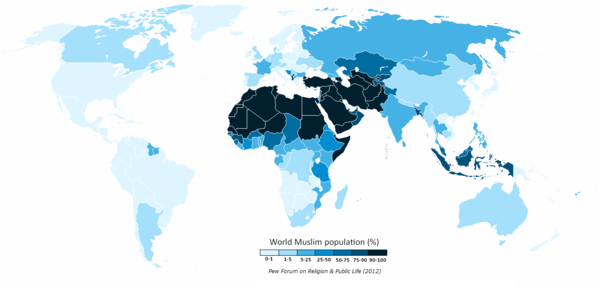
Muslims worldwide observe the month of Ramadan as a month of fasting and, therefore, travelling during Ramadan into Muslim-majority countries can pose an added challenge. Along with fasting — no eating, drinking or smoking — from dawn until sunset, Muslims also refrain from engaging in sexual relations, and especially activities that are forbidden by Islam in any month.

Ramadan is a time when many Muslims focus on their faith and spend much of the day in religious observances, so in that sense it is related to days of penance, fasting and reflection in other religions, such as Yom Kippur in Judaism and Lent in Christianity. Fasting during Ramadan is one of the Five Pillars of Islam, one of five basic acts which are mandatory for every Muslim.
During Ramadan, Muslims are expected to engage in extra prayers and worship of Allah, in order to learn willpower and self-control and for a kind of first hand experience of the sufferings of the poor, who rarely get to eat well. The ultimate goal is to inspire God-consciousness in Muslims around the globe. Many Muslims use this opportunity to give generously in charity ( zakat ), which is another one of the Five Pillars of Islam.
While Ramadan is not the easiest and most favoured time to visit a Muslim country, since daily life changes dramatically in those countries during this special month, you may have a totally different cultural experience if you do. In addition to the change in meal schedules for Muslims, businesses' opening hours often change as well, and people work only until afternoon in the majority of Muslim countries. School will take place on the usual schedule (with minor modifications for the benefit of those who observe fasting), so if you are teaching English or another subject and have Muslim students, whether in a Muslim-majority country or elsewhere, you'll want to facilitate their observance of Iftar (see below).
Get around [ edit ]
Travelling during Ramadan can be difficult, especially towards the end of the month when everybody tries to go back to their families for Eid and back again afterwards. Ticket prices are high, flights, buses and trains are frequently sold out and major highways often have epic traffic jams.
Suhoor and Iftar [ edit ]
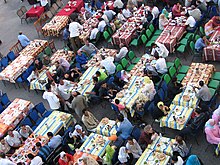
The primary practice in Ramadan is fasting from dawn to sunset (not always the local dawn and sunset, as this would be unreasonable in summer at very high latitudes), and there are two meals at either end of that period. The pre-dawn meal before the fast is called the Suhoor, or Sehri in some countries. It is consumed early in the morning before the dawn ( Fajr ) prayer.
Iftar is the meal that breaks the fast after the sunset ( Maghrib ) prayer. While Suhoor is often taken in private, Iftar is a much more social meal. Family and friends gather in homes to rejoice, and a wide variety of sweet and savory dishes and delicious desserts are prepared according to local traditions and preferences. Restaurants are busy as well and often have special dishes. Iftar parties and social gatherings are frequently arranged where people and communities gather to break fast together, and special arrangements are made daily in mosques as well, where free meals are offered to diners for them to break the fast. If you are invited for Iftar celebrations, it is good custom to bring a small gift (e.g. food) for your hosts.
Dishes for Iftar vary from one region to another, but one item that is commonly consumed around the world is dates — especially dates from Saudi Arabia , which are fantastic and well worth buying if you have a chance to do so during this month or any other.
In some Muslim countries, tour companies may be able to organise an Iftar experience with a local host for you; look around if you are interested. Charitable organizations also often set up public Iftar tents serving free meals to the poor, which you are also welcome to partake as a tourist.
Respect [ edit ]
There's a saying: "When in Rome, do as the Romans do"; the same goes for Muslim countries. Non-Muslims are not expected to fast or follow Islamic practices but they should be aware of the local laws and customs and should respect them. Even Muslims are not religiously bound to fast if they're travelling during Ramadan, though most do anyway.
The most difficult thing may be to abstain from eating, drinking or smoking tobacco in public areas during the daytime, usually dawn until dusk. In many Muslim-majority countries such as Saudi Arabia , it’s illegal to eat or drink in a public area during daylight during Ramadan, and this is considered a crime and prosecuted as such. Police usually patrol the streets and offenders, both Muslim and non-Muslim, can get fined. There have been incidents in Gulf countries where foreigners were even expelled from the country while Muslims were jailed. Even where it is legal you should refrain, both to avoid calling unwelcome attention to yourself and as a gesture of respect for those who are fasting.
Consider stocking your hotel room with drinks and snacks that you can consume in private. Some hotels will also continue to offer room service even when public restaurants are closed. If you are in an area where food is served for travellers even during Ramadan and where tipping is considered appropriate, tip heavily at this time. The poor staff are working — and seeing and smelling your food — even though they are fasting; they may deserve a little extra.
Avoid public physical intimacy with a person of the opposite sex, even if you are married to each other. Public displays of affection are considered rude and even forbidden by law in certain Muslim countries, and this is especially true during Ramadan. As for same-sex displays of affection, homosexuality is taboo or illegal in many Muslim areas. Even in more liberal areas, restraint may be a good idea at any time, and especially during Ramadan.
Everyone will be expected to dress more conservatively than normally, so ensure you dress modestly in public — always a good idea in Islamic areas, but particularly during the holy month of Ramadan. Uncovered arms, legs, shoulders or hair may offend others.
Try to not play loud music in public areas (including in a car) or dance during Ramadan, as it is seen as bad form.
Mosques such as those which are usually open to visitors for sightseeing and even to non Muslims in other times of the year remain closed during Ramadan in some countries whereas in some countries, special tours are usually organised during Ramadan.
Avoid chewing gum or smoking in public as well since these are also forbidden by the rules of the fast.
Survive [ edit ]
Think twice about travelling for business, as many businesses in Muslim countries close early and operate with a skeleton staff for the entire month of Ramadan. Furthermore, even when hours are not affected, work performance is affected by fasting. If you nevertheless need to make a business trip to a Muslim country during Ramadan, try to make your appointments as early as possible in the morning, when your counterpart is more fresh and likely to be in a good mood. During the afternoon, energy level and working performance tend to decrease, people start to get lazy and sleepy, and everyone wants to leave for home as early as possible. Keep in mind that hunger and tiredness can cause irritability, and try to be forgiving when you find people a bit cranky.
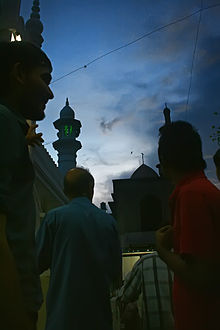
The majority of restaurants are closed during daylight in most Islamic countries, though a limited number may open to cater to non-Muslims, especially in touristy areas, or in areas with many non-Muslim locals. In some countries places keeping open may be discreet about it and best found by asking at your hotel – which might also be willing to serve you food in your room. Grabbing takeaway food from fast food chains attached to fuel stations is an option in some countries. In a few countries there really is no food available before dark even in the biggest and most touristy cities.
In some countries with lots of tourism, such as Morocco and Turkey , many facilities remain open to some extent to serve non-Muslim travellers, and in general the change in the normal routine isn't too striking at their tourist destinations.
In most countries and regions off the beaten tourist path and without large domestic non-Muslim groups, Ramadan is very strictly observed and few facilities are open. Such countries include Saudi Arabia , Iran , Pakistan and Bangladesh . The same applies to a few countries with many tourists, like Qatar and the United Arab Emirates (with exceptions in Dubai ).
Muslim countries with large non-Muslim populations include Lebanon , Indonesia , Malaysia (in bigger cities) and Brunei . In these countries, non-Muslims have access to some dining facilities, but are expected to respect those observing Ramadan; dining areas might be screened or behind curtains, or restricted to selling takeaway meals, and at some places, you may be asked to confirm that you're not a Muslim to get access.
Often there is a strict difference between areas where non-Muslims to a large extent can ignore Ramadan and areas where they are required or supposed to mostly behave like local Muslims. Still, even where you are allowed to eat, drink and enjoy yourself as a tourist also during Ramadan, the staff serving you may be fasting.
Alcohol is banned from sale or not available at all during Ramadan in many Muslim countries. You may also find that most attractions are closed during the day throughout Ramadan, as the level of activity during daytime is decreased.
Your best course is probably to emulate the locals: take it easy during the afternoon, get out of the heat, and have a nap so you will be ready for the festive evening. If you are not Muslim, have a drink and a snack as well. People usually become "night owls" during Ramadan. Festivities begin right after Iftar — shopping areas and bazaars start getting busy and remain open past midnight hours. Streets remain vibrant until Sehoor in bigger cities, and people stay awake until Suhoor time to enjoy the feast.
Even if you don't have a friend in a Muslim country you are visiting, you can still dine with Muslims when they break their fast. Around the Muslim world, tents and tables are set out on streets and in bazaars with free food served for fasting people. Non-Muslims are always welcome too. In many areas, especially in traditional bazaars, restaurants open after the sunset prayers and do a roaring trade until well after midnight.
If you're a Muslim, even in non-Muslim countries a mosque is the best place to be for Iftar. Special arrangements are made in mosques throughout the world, let alone Muslim countries, where people are served with free meals and drinks. This gives a good opportunity to mingle with locals and taste the local food at no cost. If you're travelling into a non-Muslim country, you may also be able to find restaurants near the mosques that serve Halal food. People are usually very welcoming and friendly in evenings during the joyous time of Iftar and are happy to share free food with everyone. Many restaurants offer special Iftar buffet meal deals at lower prices and some may even provide free drinks for guests.
Packing food and carrying bottles of water are strongly recommended, because food stalls are closed during fasting and open about 2 to 3 hours before Iftar, though starred hotels and minimarts often sell foods and beverages during the day, though this varies between countries and regions. Bazaars are also open 2 to 3 hours before fasting break and many kinds of foods and drinks can be found, but mainly with (extra) sweet tastes. Avoid eating or drinking during the day in public areas. You also should not eat or drink in public transport, as fellow passengers are fasting. Even airlines in Muslim countries do not usually serve food to travellers (even non-Muslims), and even if they do, it's always best to not ask for a meal as your fellow passengers may be fasting and may not be able to control their appetite after seeing a delicious meal being eaten. Children, who are not expected to fast during Ramadan, should be freely served food and drinks as usual.
Try to avoid being on the road during Iftar time, as traffic increases while everyone rushes home to feast with family members, and the chance of accidents therefore increases. Before Iftar, streets start to become empty, and right at Iftar, huge cities can become ghost towns, as public transport in many countries comes to a brief stop for up to half an hour. 3 days before and after Eid al-Fitr is not a convenient time to be on the road, because there are many traffic jams and public transport is also extremely crowded, while rental cars are very difficult to find, and if you do find one, rates will be much higher than usual. For about a week after the end of fasting month, domestic tourists flock to tourist resorts and hotel prices increase there, but in large cities, the hotels are empty.
In some cities, drummers roam the streets well before morning, waking locals in time to prepare and have Suhoor. If you don't want to follow the Ramadan schedule yourself, make sure to pack some earplugs.
Buy [ edit ]
Most Muslim countries, as well as countries with long-established Muslim minorities such as India , China , Thailand and Singapore , will have large night bazaars selling halal food, as well as clothing and decorations for the upcoming Eid al-Fitr. If you are in these areas during Ramadan, these are excellent places to try some local dishes, buy ethnic souvenirs and soak up the festive atmosphere.
Eid al-Fitr [ edit ]

The day to celebrate the end of Ramadan is one of the most joyous holidays of the year for Muslims.
While Ramadan can be a challenging time to be in a Muslim country, Eid, which is usually celebrated for three days and goes by various names around the world, is a great time to be there, especially if you have friends who invite you to celebrate with them and share some of the wonderful food that is made especially for the holiday. Each country and region in the Muslim world has its own distinctive savory and sweet foods for Eid.
Many countries have their own greetings in the local language used during Eid, but one used everywhere is the Arabic "Eid Mubarak", which translates as Blessed Eid or Happy Eid. If you're in a Muslim country, try to widely exchange the Eid greeting during the three days of Eid. Gifts are commonly given on Eid to children, friends and relatives. Most people choose to celebrate the first day of Eid at home with family and by visiting relatives and friends, but by evening, restaurants start to get crowded. Most bazaars and markets remain closed during the three days of Eid, while most other businesses are closed for longer periods.
In Malaysia and Brunei , it is customary for the king to open the royal palace to the public once a year for Eid al-Fitr, during which you can exchange greetings with the king (for male visitors) or queen (for female visitors), and lunch cooked by the palace kitchen is served to the public.
Even in non-Muslim countries, particularly those with long-established Muslim minorities, it is often possible to enjoy some aspects of this festival. Almost any restaurant which specialises in food from some Muslim region, some Muslim ethnic minority, or in halal food (food Muslims are permitted to eat under Islamic law), can be expected to do something special for Eid and, since they are doing it largely for their own community and in a spirit of celebration, both quality and pricing tend to be very good.
See also [ edit ]
- Middle Eastern cuisine
- Previous Featured travel topics
- Has custom banner
- Topic articles
- Guide topics
- Guide articles
Navigation menu
- Albalagh.net
- AnswersToFatawa
- Arij Canada
- Askimam.org
- Askmufti.co.za
- AskOurImam.com
- CouncilofUlama.co.za
- Darulfiqh.com
- Darulifta Azaadville
- Darulifta Deoband Waqf
- Darulifta-Deoband.com
- Daruliftaa.com
- DaruliftaaMW.com
- DaruliftaaZambia.com
- DarulIftaBirmingham
- Darulihsan.com
- DarulUloomTT.net
- Fatwa-TT.com
- Fatwa.org.au
- FatwaCentre.org
- HadithAnswers.com
- IslamicPortal.co.uk
- IslamicSolutions.org
- Jamia Binoria
- Mahmoodiyah
- Mathabah.org
- Muftionline.co.za
- Muftisays.com
- MuslimaCoaching.com
- Seekersguidance.org
- ShariahBoard.org
- Tafseer Raheemi
- TheMufti.com
- ZamzamAcademy.com
- BinBayyah.net
- Darul Iftaa Jordan
- Shafiifiqh.com
- HanbaliDisciples.com
- TheHanbaliMadhhab.com
- Ask Question
- Lailatul Qadr

Home » Hanafi Fiqh » Darulifta-Deoband.com » What is the ruling for fasting while traveling during Ramadan?
Related Q&A
- Can qaza fasts in Ramadan be adjusted in Eid and still receive the reward?
- Making up for missed fasts
- I had my baby during the month of Ramadan, and was therefore not able to fast during the holy month. I would like to know in what ways am I to…
- Is it permissible to make up for Ramazan Roza (fast) later?
- Is someone who breaks Ramadan fasting & does qaza still aasi (sinful)?
- To gain the reward of fasting in the month of Shawwaal (6roza's) it has to be followed by the Roza's of Ramadhaan (entire month). what is the…
What is the ruling for fasting while traveling during Ramadan?
(Fatwa: 1435/1435/M=1431)
No, it will not be exempted, it is necessary to make qaza of the missed fasts after the month of Ramadan.
Allah (Subhana Wa Ta’ala) knows Best
Darul Ifta , Darul Uloom Deoband
This answer was collected from the official ifta website of Darul Uloom Deoband in India.
Read answers with similar topics:
Random Q&A
Is there a sin for not praying wājib prayer like witr what is the order of priority for types of prayers e.g. fardh, sunnah, wājib etc., when is the friday prayer valid, blood transfusions and donations: a detailed explanation, is salāt al-awwābīn six rak’ahs after the sunnah of maghrib or does it include the two sunnah rak’ahs of maghrib, what can i do to cure my condition caused by a makhluq inside my body, how does sharia define the concepts of moderation and extremism, more answers….
- Can Qur’an Sharif be recited while leaning against a bed headboard?
- What is the source of the Azab-e-Qabr?
- How can I get my parents to understand the importance of tabligh?
- Can non-Islamic bank interest be donated to charity?
- What could be causing my brother to shout and wake up in the middle of the night?
- How can I be cured of Jadu ki asrat and other health issues I’m facing?
Latest Q&A
- Is Makeup Allowed During Iḥrām?
- Do These Actions Formulate Disbelief?
- The Status of a Job Acquired with False Certification
- Can a Ḥanafī Resident Pray Behind a Shāfi’īe Traveller?
- Is it Permissible to Allow Wheelchairs in a Masjid?
- Is an Entry Fee at a Charity Event Considered Charity?
Indexed Websites
Privacy overview.
National Geographic content straight to your inbox—sign up for our popular newsletters here

What you need to know when travelling during Ramadan
Ramadan is the holiest month in the Islamic calendar, but how do you navigate travelling during this time and should you be travelling at all?
Ramadan is the month in which Muslims believe God first spoke to the Prophet Muhammad; when the community won its very first battle and when Muhammad returned triumphant to Mecca in 630 CE.
In the month of Ramadan, Muslims enter a period of pious abstinence during the day, fasting from sunrise until sunset, and engage in fervent worship through the night. As a result, many Muslim-majority countries adjust their societal norms accordingly. So, what is it like to travel to these places in Ramadan, and should we travel to them during this month? Here are the answers to key questions on travellers’ minds.
How do I know when Ramadan starts?
Every year Ramadan falls on a different date in the Gregorian calendar. This is because the Islamic calendar follows the actual cycle of the moon and so the start date is only confirmed the night before when the new moon has been sighted. Even then, regional differences mean Muslims often start and end Ramadan on slightly different days. For example, while many Sunni Muslim countries will follow the announcement by Saudi Arabia, some will go with their own domestic sighting, so it’s important to check locally if you’re trying to avoid the month or are seeking it out.
Can I eat in public during daylight hours?
This all depends on what kind of Muslim area you’re travelling to. If it’s a place in a Muslim country with a religiously mixed community, like Sarajevo in Bosnia or a place used to hosting non-Muslim tourists throughout the year, like Sharm el-Sheikh in Egypt, then yes, this is fine. However, when travelling through Muslim-majority communities that are not mixed or unfamiliar with tourism, it’s best to eat and drink behind closed doors during the day.
Can I consume alcohol (and what about soft drinks)?
Where the community is mixed or used to serving non-Muslim tourist traffic, the bars will most likely be open and function as normal. In areas where the community is largely Muslim or unfamiliar with tourists, such as the Muslim-majority state of Pattani in southern Thailand, it’s unlikely you’ll even be able to source alcohol there and, if you do, as with eating in public, it’s advisable to drink it behind closed doors.

Will every Muslim be fasting?
While fasting is an obligation for every able adult Muslim, those that are ill, pregnant, breastfeeding, menstruating or travelling don’t have to fast. However, even these Muslims will be respectful in areas where everyone appears to be fasting by not eating or drinking outside during daylight hours.
What should I be wearing and is it any different to any other time of the year?
No, you should wear whatever you would expect to be wearing in your destination based on your research, as there are no specific changes to the way Muslims dress during Ramadan. However, some may choose to dress more conservatively because of the pious mindsight they’ll be adopting during the month.
Are tourist attractions, shops and restaurants open?
Muslim-majority towns and cities will make a noticeable shift in the working hours of most businesses during Ramadan. However, to which degree will again largely depend on the kind of Muslim area you’re travelling to. For example, in Muslim-majority Tunisia somewhere like Kairouan, a very holy city not on the popular tourist trail, will appear sleepier and slower during the day with most local businesses opening and closing much later than usual (if at all). Meanwhile, almost nothing may change for travellers visiting the Tunisian tourist hotspot of Sidi Bou Said, during Ramadan.

Will I be allowed to visit mosques, shrines or Sufi lodges (sacred religious spaces separate from the mosque) during Ramadan?
Once the sun sets, places of worship will be heaving with people during Ramadan and this will continue right through to the early hours of the morning. In the multi-religious and tourist savvy places, it may be possible to join an iftar — the meal to break the fast — for free at a large mosque, but otherwise the ideal time to visit places of worship will be between dhuhr (midday) and asr (mid-afternoon) prayers. This is because the caretakers of these spaces will be resting in the early part of the day following lengthy prayers late into the previous night. That said, many larger mosques and spaces of worship in tourist cities, such as Istanbul, may open as normal during the early part of the day.
What regional differences can I expect during Ramadan?
Each region will have its own distinct Ramadan foods, be they sickly sweet jalebis across the subcontinent, delicious mercimek çorbası (lentil soup) in Anatolia or filling koshari in Egypt. In Bosnia, many large mosques host live Qur’anic recitations where locals gather to listen during the day, while in Malaysia the mouthwatering iftar buffets at hotels are legendary. Meanwhile, the nights across the Gulf are filled with shrieking crowds watching nocturnal neighbourhood football tournaments and in Algeria it’s the sound of traditional chaabi and ma’luf music you’ll hear drifting out of local theatres playing host to special late night Ramadan concerts.
How might I experience Ramadan best as a tourist?
With night effectively turning to day, if you do intend to travel to a Muslim-majority place during Ramadan, do what the locals do. Sleep in the early part of the day and stay up late into the night, revelling in the festive atmosphere of town centres and around large mosques, before eating the delicious and unique Ramadan foods and heading out to either watch a raucous local cup final in a Jeddah neighbourhood, or join a concert in Constantine.
Related Topics
- RELIGIOUS TRAVEL
- CULTURAL TOURISM
- ISLAMIC WORLD
You May Also Like


How do we know when Ramadan starts and ends? It’s up to the moon.

Why Ramadan is the most sacred month in Islamic culture
Free bonus issue.

This unique Camargue pilgrimage is a fitting tribute to France's most singular region

Open a portal to the underworld at these Buddhist ‘hell parks’

Experience: The Festival of the Giant Omelette

Top 10 pilgrimage routes around the world
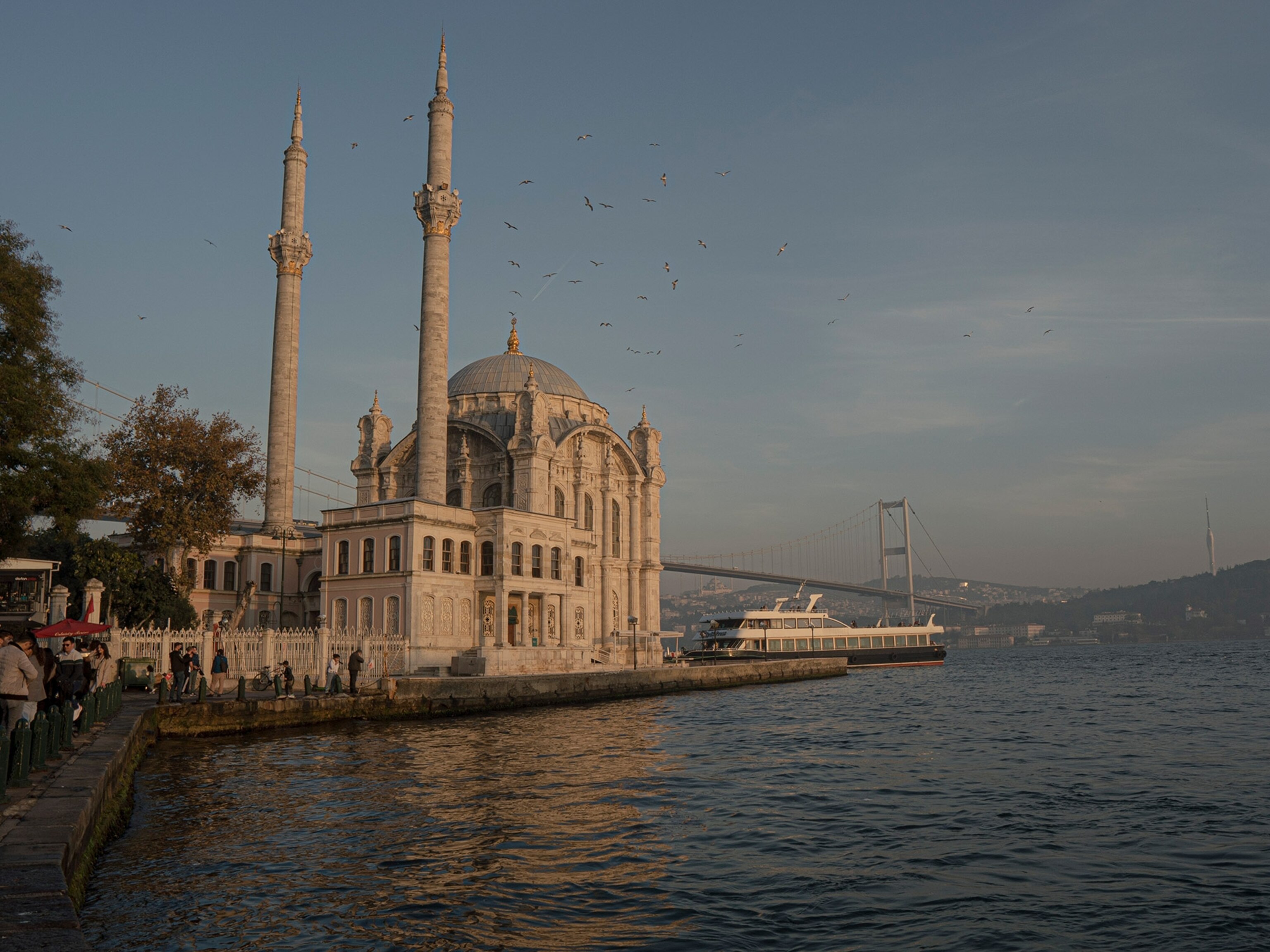
What can we learn from Istanbul’s 3,000 mosques?
- Environment
- Perpetual Planet
- History & Culture
History & Culture
- History Magazine
- Mind, Body, Wonder
- Terms of Use
- Privacy Policy
- Your US State Privacy Rights
- Children's Online Privacy Policy
- Interest-Based Ads
- About Nielsen Measurement
- Do Not Sell or Share My Personal Information
- Nat Geo Home
- Attend a Live Event
- Book a Trip
- Inspire Your Kids
- Shop Nat Geo
- Visit the D.C. Museum
- Learn About Our Impact
- Support Our Mission
- Advertise With Us
- Customer Service
- Renew Subscription
- Manage Your Subscription
- Work at Nat Geo
- Sign Up for Our Newsletters
- Contribute to Protect the Planet
Copyright © 1996-2015 National Geographic Society Copyright © 2015-2024 National Geographic Partners, LLC. All rights reserved
Spotlight on: visiting Marrakesh during Ramadan
Apr 18, 2019 • 3 min read
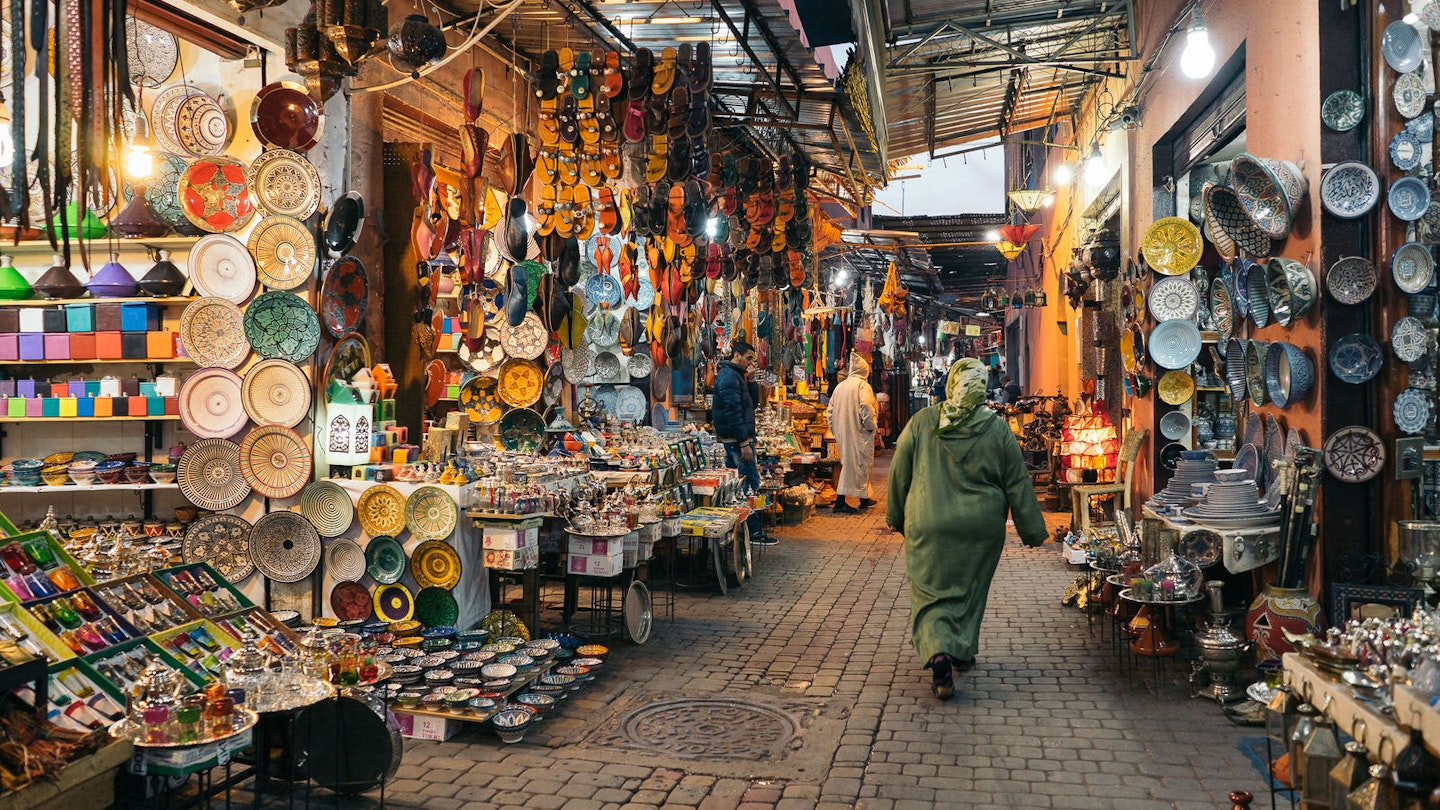
MARRAKESH, MOROCCO - JANUARY 3, 2017: Moroccan woman in the souk near the square of Jemaa el-Fna.
With Ramadan generally meaning a wind-down all over the Muslim world, you might expect that the red city of Marrakesh shuts up shop for the month, but that isn't exactly the case. While the holy month means that many in Muslim-majority Morocco will be fasting during daylight hours, that doesn’t mean that Marrakesh is in any way off limits (though it might make finding an end-of-the-day beer a bit harder).
For travellers, the main difference will be the shortened opening hours, as many business and sights close either earlier in the day or for a chunk of the evening as Muslims gather together to break fast in a meal known as iftar . Here are some tips on visiting Marrakesh during Ramadan.
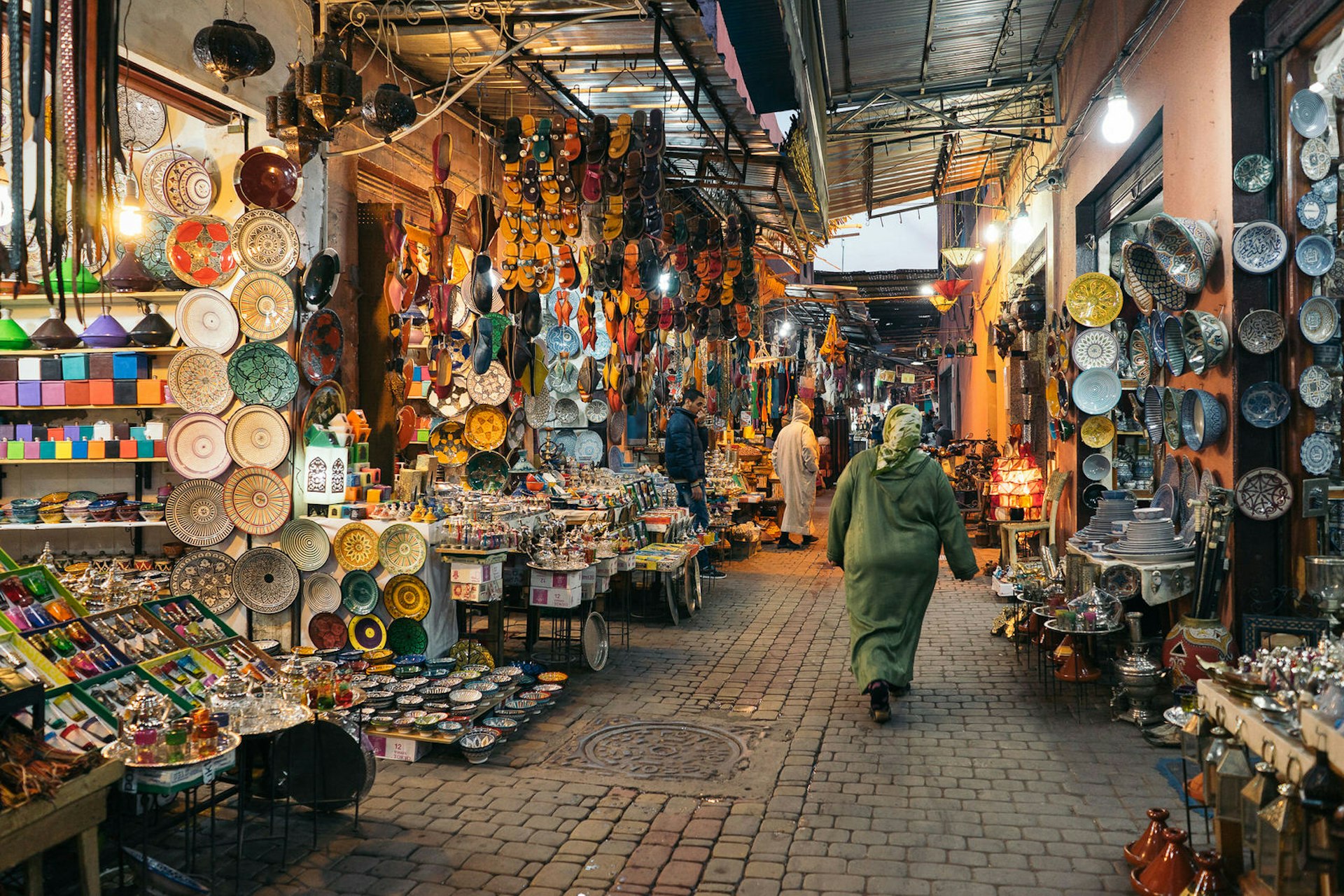
Enjoy the quiet streets
Much of Marrakesh’s old city will be quieter during the days in Ramadan as locals choose to spend the fasting days relaxed at home and then venture out at night. For those put off by medina crowds, it could be an excellent time to traverse winding streets that would otherwise be swamped. Food markets get busy again during the afternoon as people prepare for the large evening meal.

Find an iftar dinner
Stories abound of travellers being called in off the street by friendly Moroccans for the nightly iftar celebrations when Muslims break the day's fast with a communal meal. Whilst serendipity might strike for you, if you want a definite dinner, it’s best to look at local restaurants. Noted culture-hub-turned-restaurant Cafe Clock offers a nightly iftar buffet for Dh70 a head.
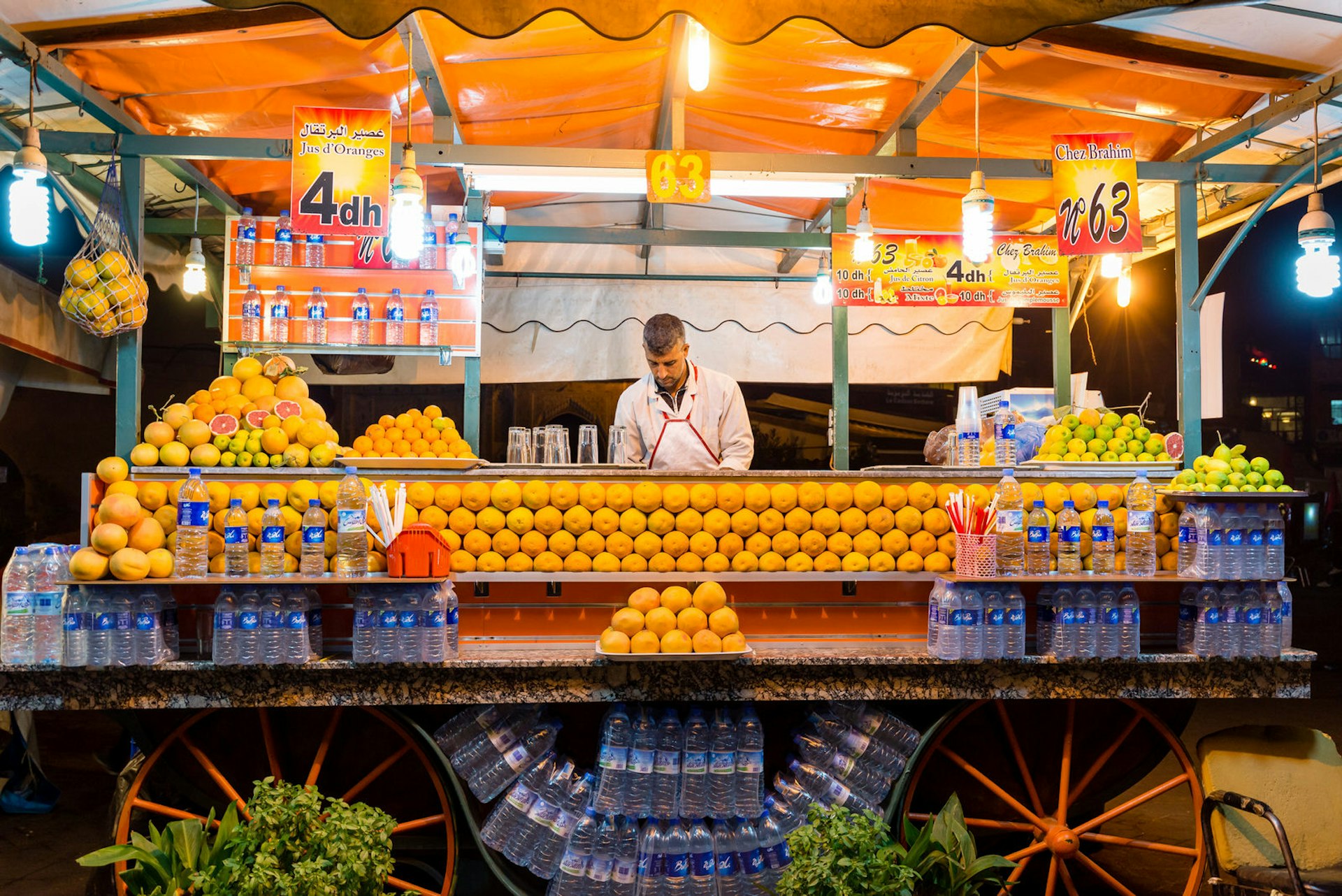
While not impossible, alcohol will be harder to find all over the country during Ramadan with some Muslims refusing to even touch the bottles during the holy month. Larger hotels aimed at tourists are likely to still serve booze though many smaller bars will close for the period or stay open while not serving alcohol. The popular 68 Bar A Vin , as one example, will close for the whole month. Supermarket alcohol shops will sometimes be open but might ask to see your passport as proof you’re not a local. The extra hassle means it might not be a bad idea to spend the trip sober; swap your end-of-the-day beer for a stop at the juice carts on the Marrakesh's central Djemaa El Fna square.
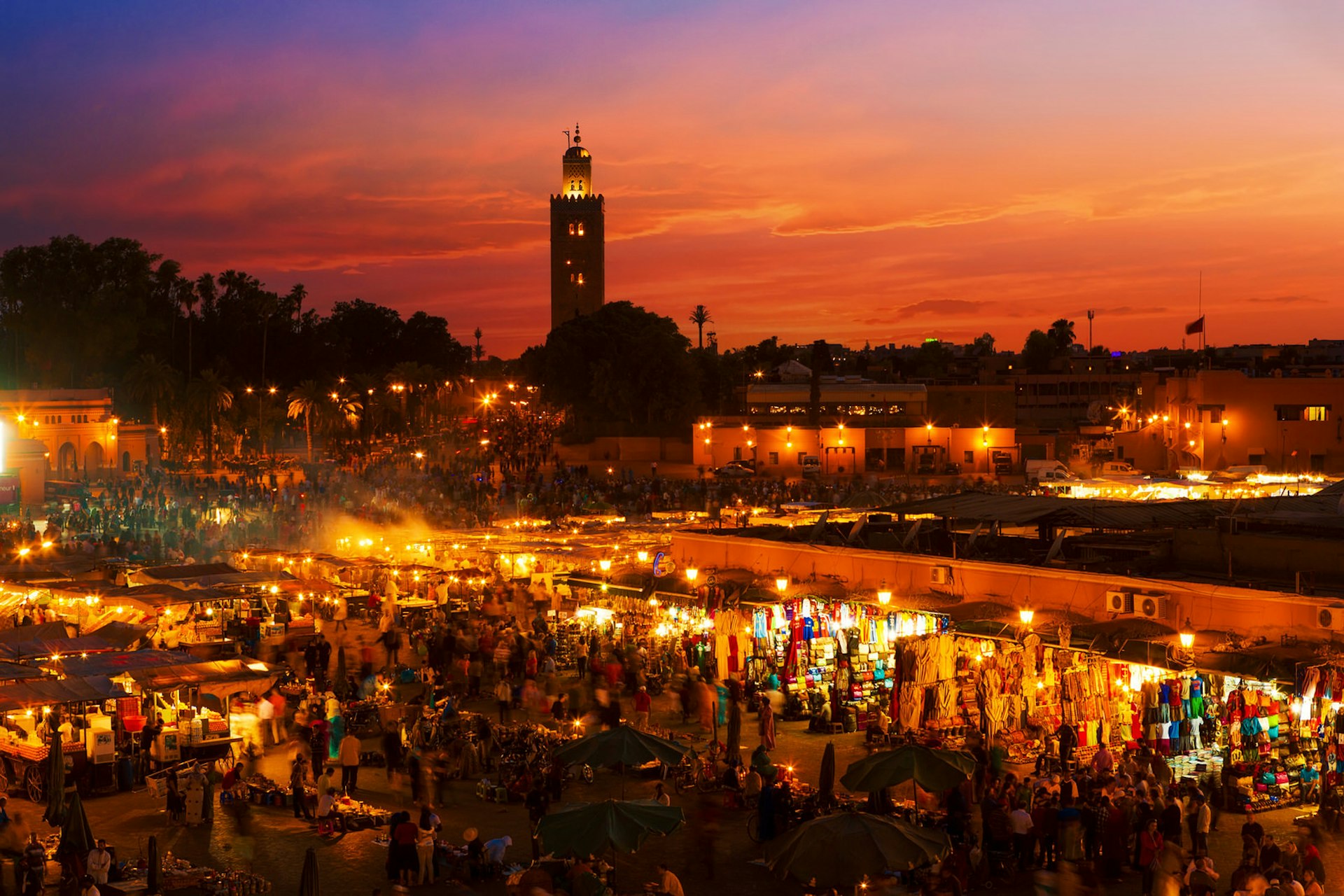
Move your action to the night time
Though the quiet days and rising temperatures might give the city a listless feel during Ramadan, Marrakesh will very much come alive again at night. Many Muslims, having broken fast at sundown, will then head out to meet with friends and family late into the evening. Consider indulging in the greatest of past times: the afternoon nap, and then staying up later into the night as Djemaa El Fna and the nouvelle ville fill up with full stomached Moroccans looking for a friends and fun.
http://shop.lonelyplanet.com/morocco/pocket-marrakesh-4/
Explore related stories
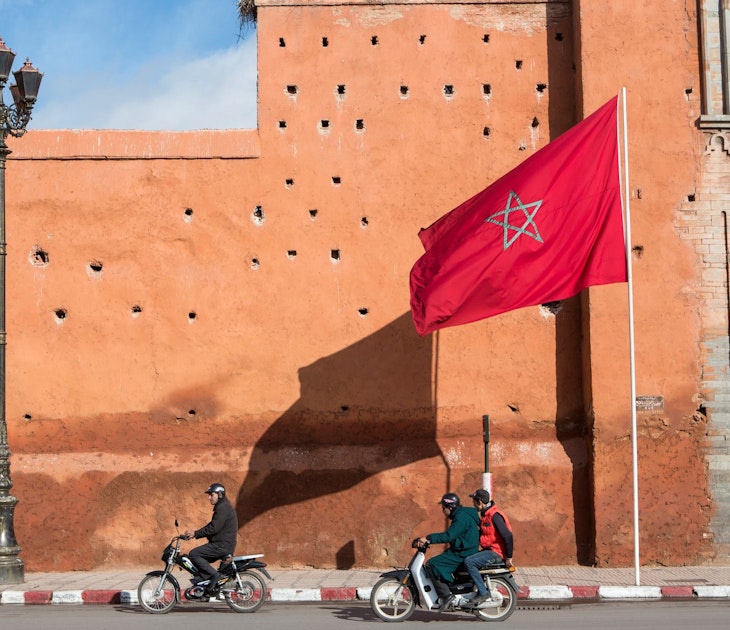
Mar 29, 2024 • 9 min read
Discover the best things to do in Morocco, from mountain to desert, city to coast.

Mar 11, 2024 • 5 min read
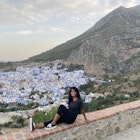
Jan 17, 2024 • 6 min read
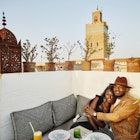
Nov 30, 2023 • 11 min read

Aug 30, 2023 • 5 min read
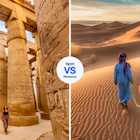
Aug 10, 2023 • 7 min read
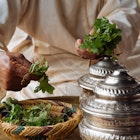
Oct 6, 2022 • 6 min read
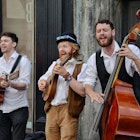
Jan 22, 2020 • 11 min read

Jan 20, 2020 • 5 min read
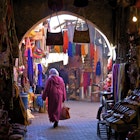
Dec 10, 2019 • 7 min read

How is it to Travel during Ramadan in Morocco – 6 Helpful Tips
How can you prepare for a trip during Ramadan in Morocco ? Are the restaurants and food stores open for foreigners? What should you expect and what do you need to know if you plan to visit Morocco during Ramadan?
I’ve spent a fair amount of time in Morocco , all in all almost two years. Over the course of that time, I saw different parts of the country and learned loads about the Moroccan culture.
It’s a place that I’ve fallen in love with and to which I keep going back to. Now for the second time, I’m going to travel in the country during Ramadan.
For non-Muslims, Ramadan probably sounds like a very demanding month and the idea of being in Morocco during that time might seem a bit disconcerting. We are after all not used to fasting from dawn till dusk.
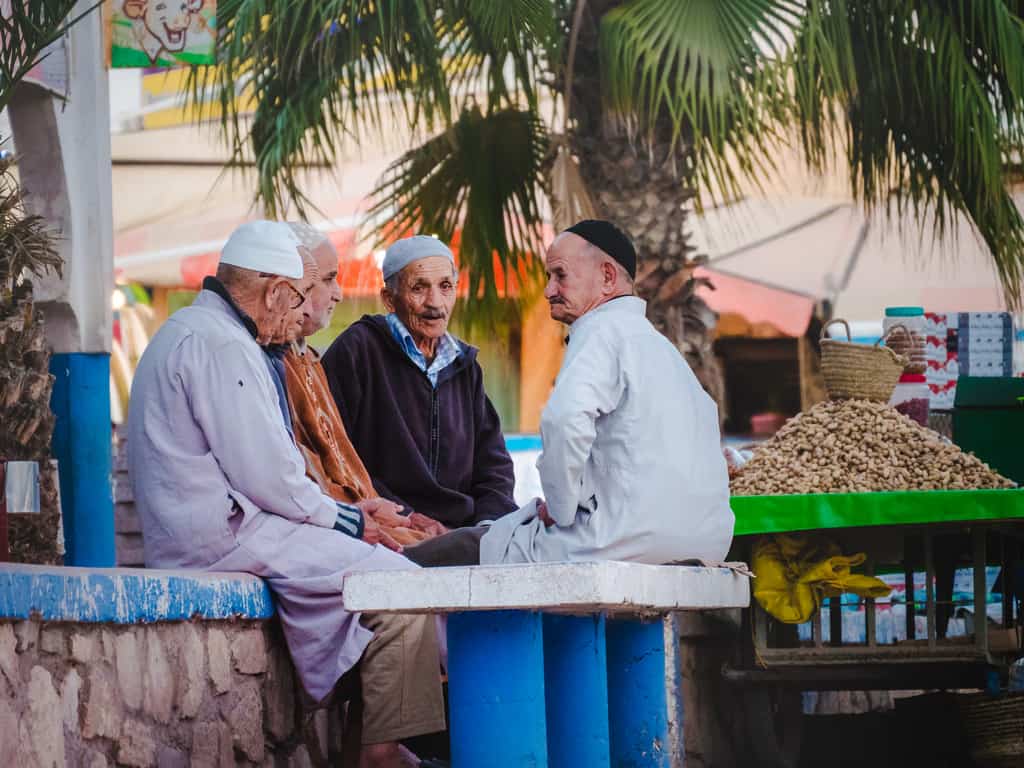
In Ramadan, it’s still possible to buy nuts but no one is allowed to eat during the day…
And fasting isn’t the only challenge during Ramadan. Imagine not drinking any water or coffee, not smoking any cigarettes (if you’re a smoker) and not having sex. Obviously coffee is what I would miss the most.
Now picture hundreds of thousands of people in your city collectively facing those challenges. That’s a lot of tense, hungry, jittery people rubbing shoulders in the streets.
What about the locals? Don’t Moroccans become easily irritated during Ramadan? How does not eating and drinking for thirteen hours at a time affect them?
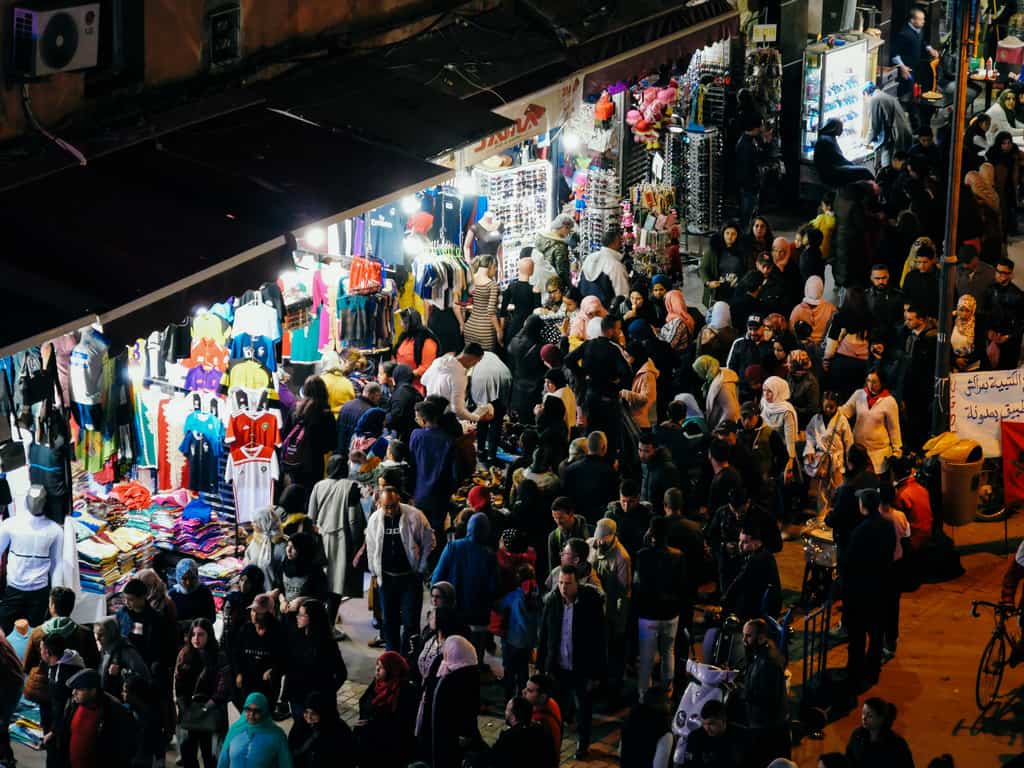
Imagine thousands of people fasting at the same time…
Moroccans will tell you that this experience brings them closer to God. That they feel ecstatic and happy while fasting and that spending all those hours without eating is actually not that hard.
Ramadan definitely feels like a sacred moment in a way and people spend more time with their families and loved ones during that month.
Morocco becomes a different place during Ramadan, that’s for sure, and many travelers anticipate problems and inconveniences when traveling to Muslim countries at that time of the year.
But how is it really to travel to Morocco during Ramadan? Is it as challenging as it sounds? How can foreigners prepare for a trip to a Muslim country during Ramadan if they don’t want to fast?
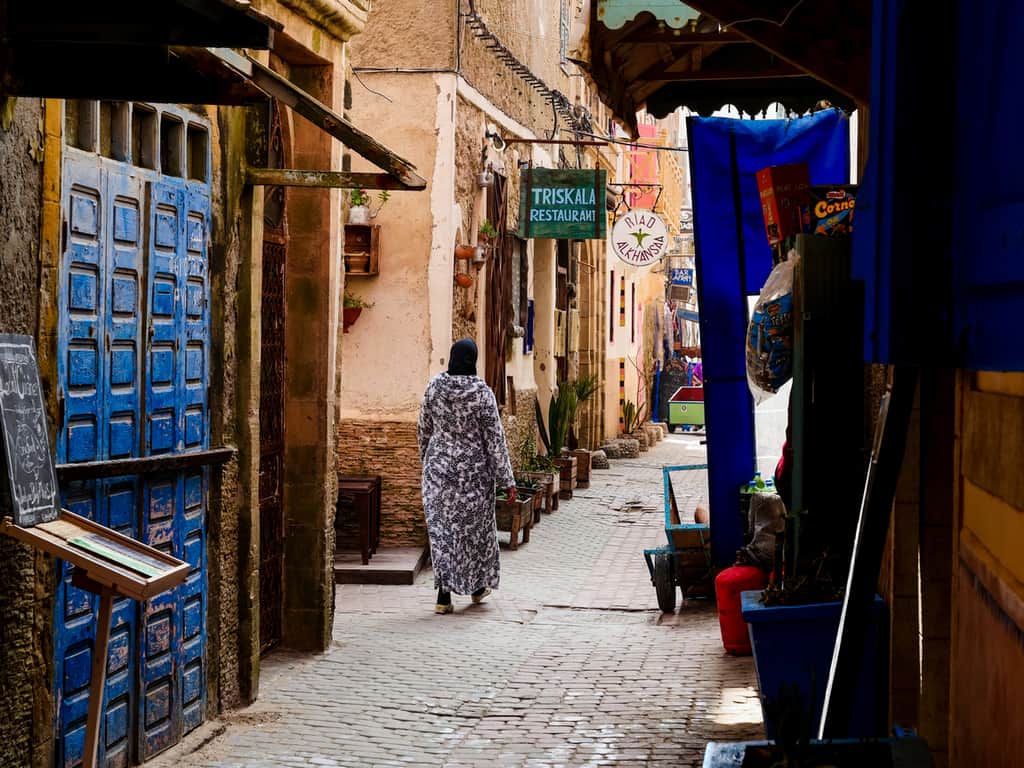
And what if you’re not Muslim but you’d like to fast in Morocco during Ramadan? How should you do it?
If you keep reading I’ll show you that there is no reason to put aside your plan of traveling during Ramadan in Morocco and how it can be a much more exciting and enriching experience to travel during that sacred month.
Tip: See my Morocco Travel Page for a complete overview of all my travel guides and blog posts about Morocco!

Morocco T r a v e l G u i d e : 19 useful things to know before traveling to Morocco
Disclaimer: This posts might contain affiliate links, meaning that if you make a purchase through these links, I may earn an affiliate commission. Thank you for helping to support this website!
Morocco Travel essentials and resources
- Morocco Travel Guide: 19 things you should know before you go
- Where to go: The 17 most beautiful places to visit in Morocco
- Plan your trip: 3 itineraries to discover the best of Morocco
- Is Morocco safe: 18 useful tips to stay safe while traveling in Morocco
- Tours and experiences: Book a customized tour
- Where to stay : Find a room in a hotel, hostel, guesthouse or desert camp
- Travel Insurance: Find the best travel insurance for Morocco
- Getting around : Rent a car in Morocco or travel by bus or train
TABLE OF CONTENTS
1. What exactly is Ramadan?
Ramadan is a month-long Islamic holiday. It’s not celebrated at fixed dates because the Islamic calendar follows a lunar pattern. This means that every year, Ramadan is pushed by 10 days. During this month, Muslims spend part of their day fasting. This fast isn’t only limited to food, it also includes water, coffee, and juices.
The day begins early. People wake up around 4 am to eat right before the sun rises. After that, they’re not allowed to eat until the sun has set.
Once that happens, people are allowed to eat again and break their fast in the company of family, colleagues or friends. They eat a hearty meal composed of Harira soup, sweets, pastries, and fruits. In the evening, once they have eaten, many Muslims will then attend special prayers in the mosques.
Ramadan is meant to be a time when people reflect on their blessings and good fortune and it’s also an opportunity for Muslims to understand the suffering of those who don’t have food or water.
During this time, Muslims will try to enhance the good in their lives while practicing to resist sin. This annual ritual is also regarded as one of the Five Pillars of Islam .

Things to do in Marrakech – A Complete Guide to Morocco’s Red City

2. What should foreigners expect during Ramadan in Morocco?
Before I traveled to Morocco for the first time, I thought that Ramadan had to be strictly followed, even by foreigners. I was sure that if I got caught drinking water in public, I would end up in big trouble, either kicked out of the country or even worst, put in jail.
I was totally convinced that it would be impossible to find any restaurant or convenience store selling food during the day. I found out this isn’t exactly the case. Morocco is quite lenient when it comes to Ramadan and especially towards foreigners.

What to expect in the day during Ramadan
A lot of convenience stores are not open in the morning but in the afternoon you can buy food and water at a few corner stores. Buying food during the day isn’t really the problem, the hardest part is finding open food stores.
The same goes for restaurants as only a small amount stays open for foreigners during the month. If you plan to stay in big cities like Rabat , Tangier , Marrakech , or Meknes You can find out with Trip advisor which restaurants stay open during the day in Ramadan.

20 Top Things to do in Tangier – Complete City Guide
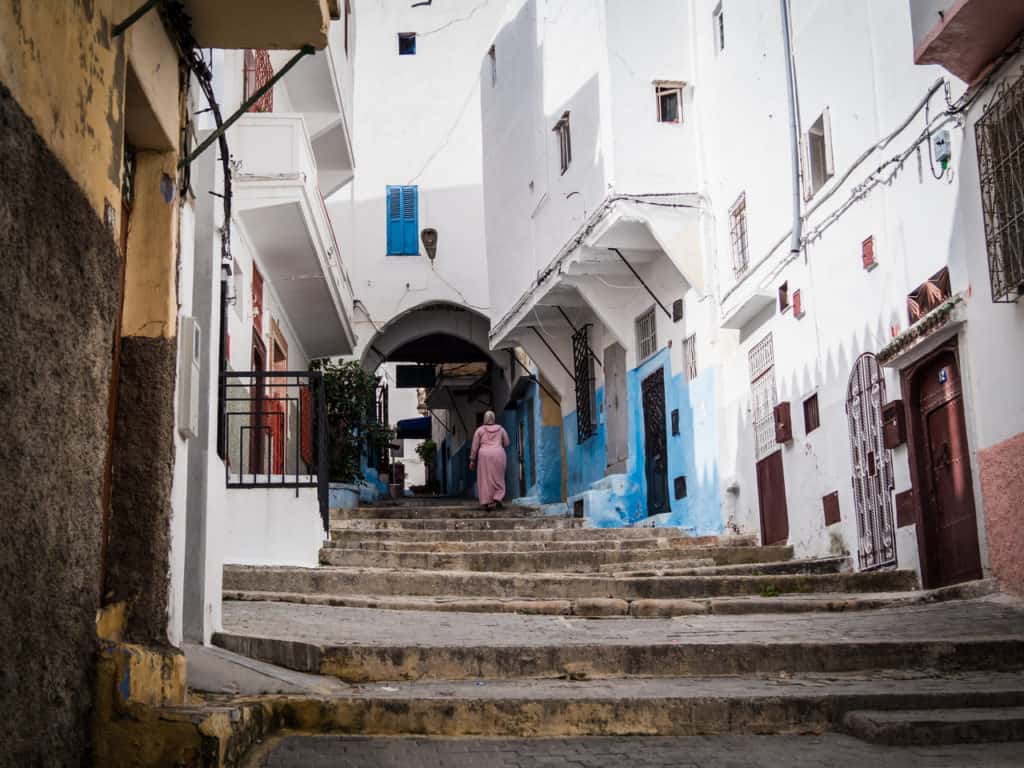
A lot of restaurants and food stalls are closed during Ramadan…
The best and easiest way is to eat and drink in the privacy of your hotel room in the daytime. The same goes for smoking. Foreigners shouldn’t have any problem if they smoke within the compound of their accommodation in Morocco.
Even if you choose not to participate in Ramadan, I would advise not to eat, smoke or drink in public. It’s a way of showing respect for the culture and religion, and Moroccans will appreciate your effort.

Avoid smoking, eating, and drinking during Ramadan unless you’re in the privacy of your hotel or riad…
What to expect after sunset during Ramadan in Morocco
After sunset, however, things are completely different. Some restaurants are open from 6 pm until 1 o’clock in the morning. Even big food stores like Carrefour and Acima are open until 1 am.
Many Moroccans invite their friends and family to eat and break the fast with them. It might happen that they will receive you, as a traveler, as well. Moroccans show particular hospitality to foreigners who are traveling alone during Ramadan.
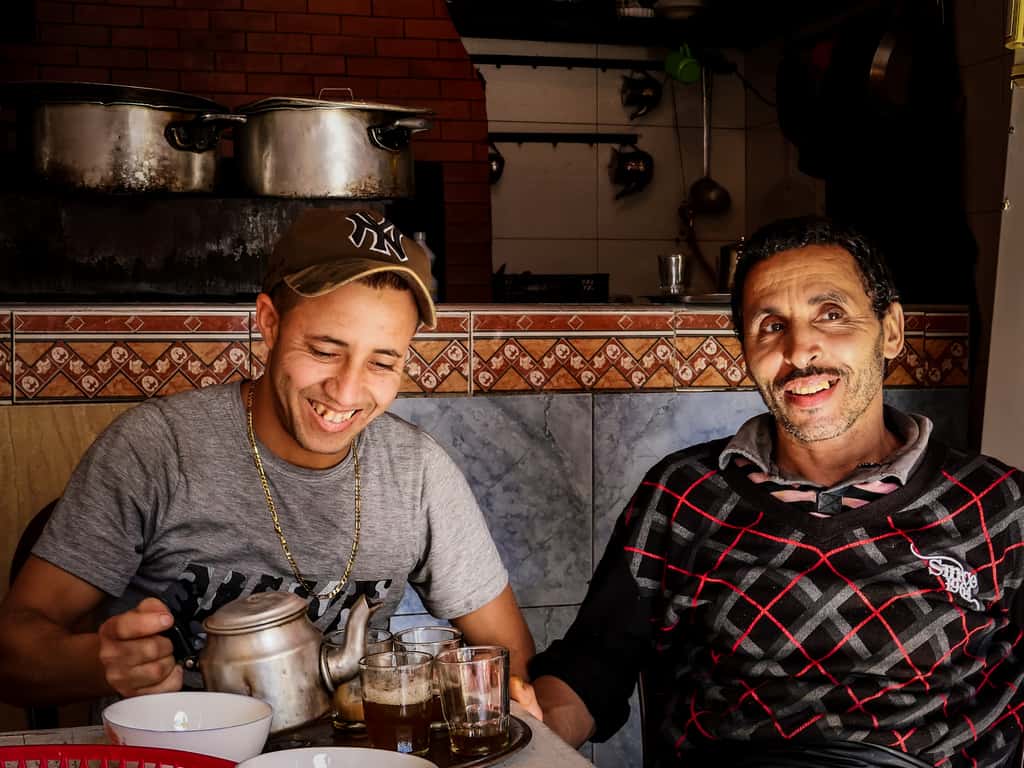
After sunset, men will break the fast in the company of their friends and family…
It’s quite festive to see people gathered around a huge table filled with delicious Moroccan dishes and splurge on all that food.
Another cool thing is that a lot of restaurants in Morocco will have a special menu for the evening during Ramadan. They offer what is called the ”iftar” or the evening meal. This meal is often composed of dates, ”Harira soup” and ‘Briouats”. It’s hearty, sweet, and energizing after a long day on an empty stomach.
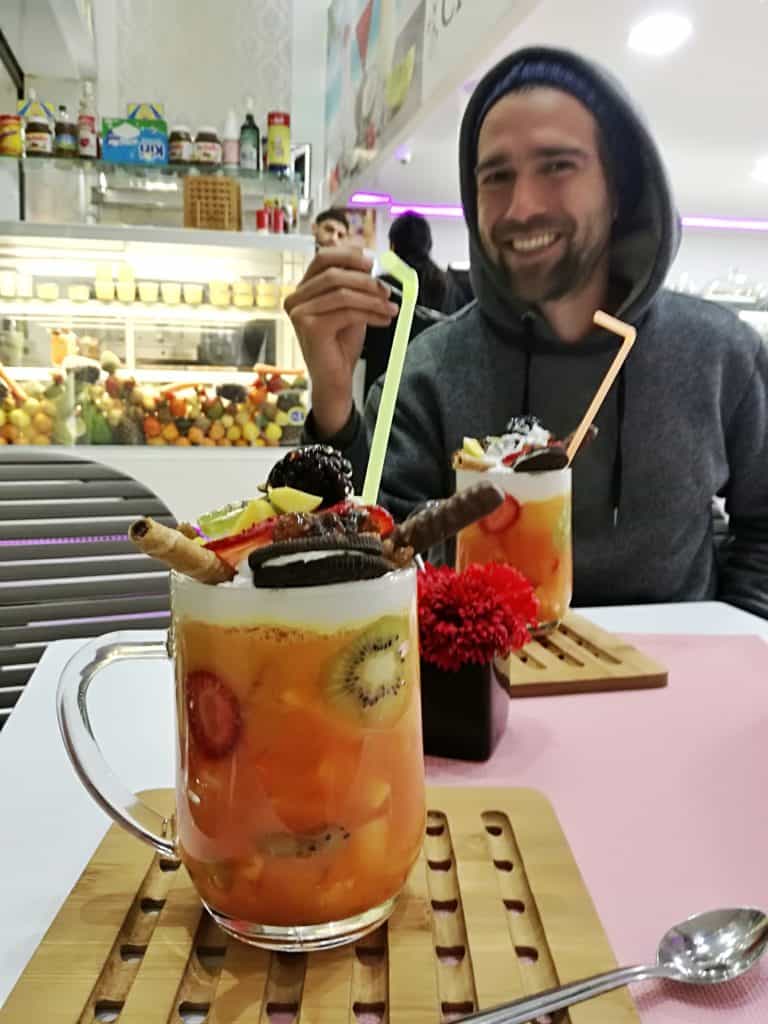
Good fruit juice is also a perfect way to break a fast during Ramadan in Morocco…
What happens after Ramadan in Morocco?
The day that follows Ramadan and that marks the end of the fast is very special for Muslims. It’s called Eid al-Fitr and it’s a significant Muslim holiday. It’s often referred to as the small Eid.
During that day, Muslims will do special group prayers, give donations to the poorest of their communities and congratulate each other for going through the fasting period.
What do people eat in Morocco during Eid al-Fitr?
Because Eid al-Fitr is mainly a time when families get together, a huge tagine is often the typical meal. It’s served with bread, fresh fruits, and delicious Moroccan tea.
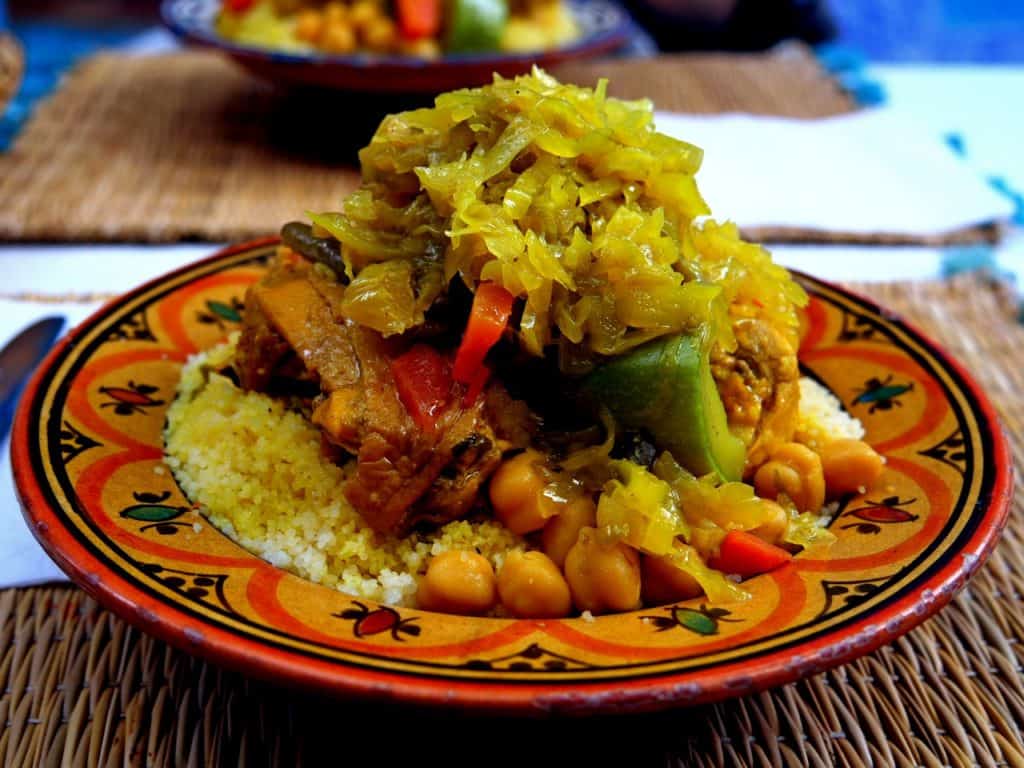
A great meal after a month of fasting is a hearty tagine…
Another popular meal is chicken with lemon and olives. All the relatives will be invited to share these savory dishes during Eid al-Fitr.
I fasted for the last two weeks of Ramadan when I lived in Tangier . I remember the Eid al-Fitr meals being the most delicious meals I ever had. The chicken tagine was so tasty after just a few weeks of fasting, I can’t imagine what it must taste like after a whole month.

Morocco Photography Tips – How to take portraits of the Moroccan people
3. Do all Moroccans fast during Ramadan?
While I was traveling around the country, I also discovered that a good amount of Moroccans don’t fast during Ramadan. They will, however, be very discreet not to eat, drink or smoke in public and will only do so in the privacy of their home.
I don’t think Moroccans are very vocal about not fasting and if they decide to eat during Ramadan, they probably won’t tell anyone except those in their close circle of friends.
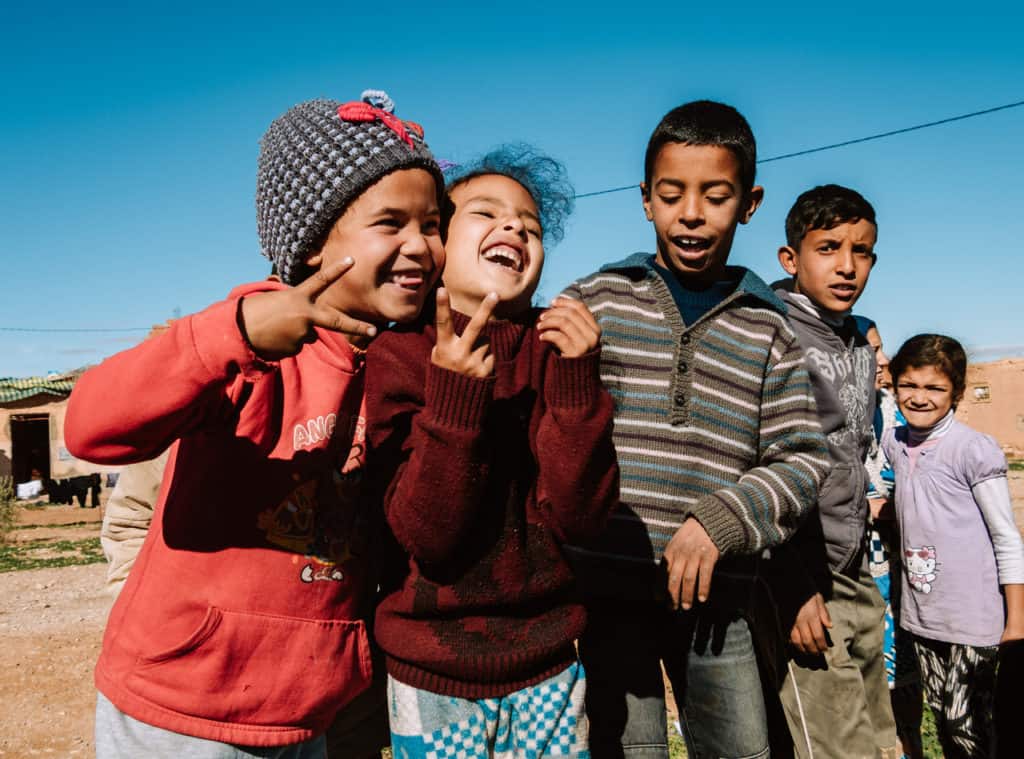
Kids don’t have to fast during Ramadan…
Women that are having their periods can also abstain from fasting and from a variety of religious duties that are otherwise considered obligatory, including ritual prayers.
The fasting days missed due to menstruation have to be made up as soon as possible and some women will even fast for a few extra days after Ramadan to make up for the days they skipped.
Sick and old people can abstain from fasting without having to catch up for those days later.

The 17 most beautiful places to visit in Morocco
4. Should you travel to Morocco during Ramadan and will it affect your holiday?
This is a good question. It all depends on what kind of experiences you want to have in Morocco.
If you travel to the country with the intention of partying and going for shopping sprees in Rabat or Casablanca , it might be the worst time of the year to be there.
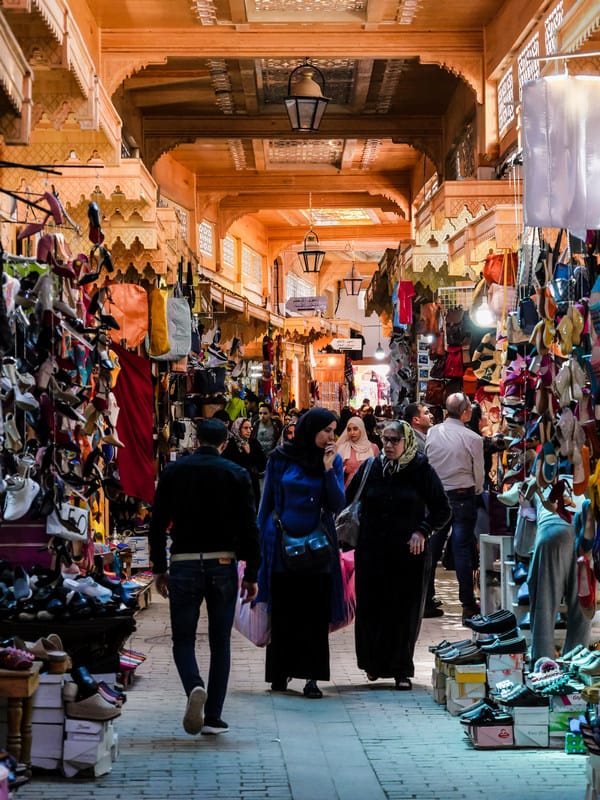
If you’re going there to discover an exciting part of Moroccan culture, then I would strongly advise traveling to Morocco during Ramadan.
You should consider that Ramadan falls on a different date every year. When Ramadan happens during summer, the hours of fasting are considerably longer and this combined with the extreme heat in Morocco can make it much harder for both locals and foreigners.
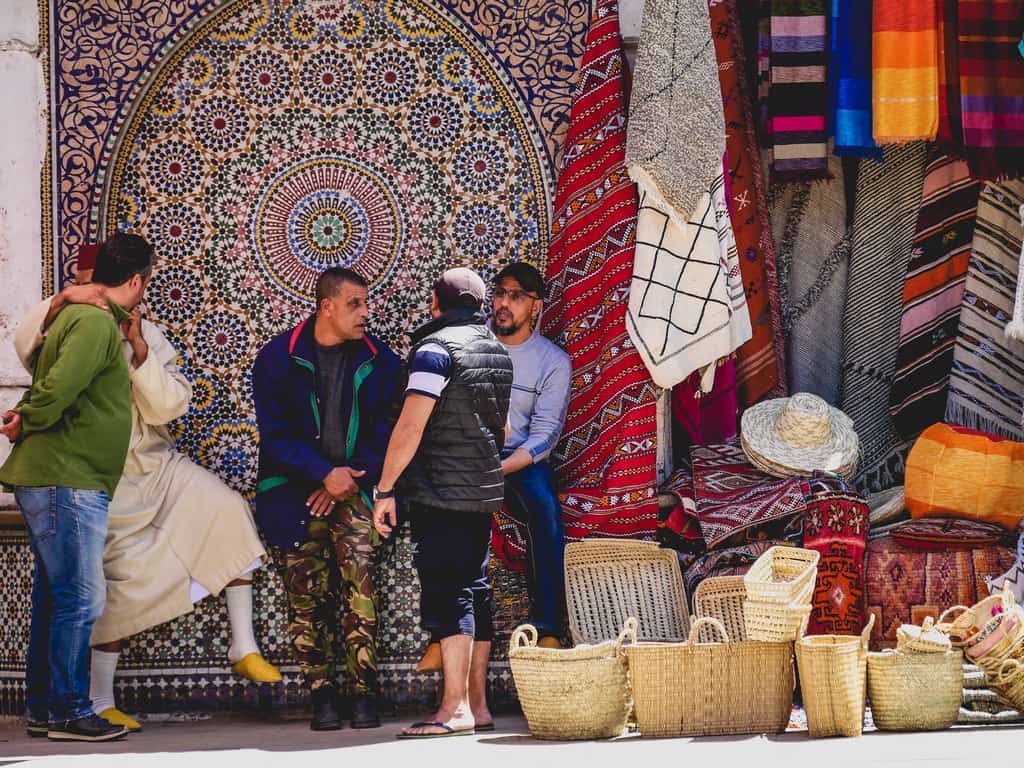
It’s better to look for a bit of shade when Ramadan is in summer…
If you can only come to Morocco for a short while, I recommend coming towards the end of Ramadan so you also get to see the Eid al Fitr, the celebration that follows the month of fasting. It’s a day when people make donations to the poor and feast to celebrate the fast they went through.
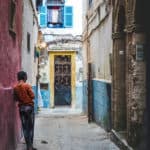
Is Morocco Safe? Useful Things to Know before you go
Here are the advantages and disadvantages of traveling to Morocco during Ramadan:
The good sides of being in Morocco during Ramadan:
The first reason to visit Morocco during Ramadan is that you’ll have the chance to see an event that only happens for one month every year. You’ll get to see an essential part of the Moroccan culture and witness an event that is sacred to Muslims.
People will often invite you to break the fast with them and share the ”Iftar” (the meal after the daily fasting).
Another great side of traveling to Morocco during Ramadan is that the accommodation in major cities tends to be slightly cheaper during that period.

Many friendly Moroccans will invite you to break the fast with them and have some tea…
The downsides of traveling to Morocco during Ramadan:
While Ramadan is very interesting to witness, if you’re a foreigner and you don’t intend on fasting, being in the country at that time of the year requires a certain degree of preparation.
You’ll need to stock up on food in the evening to have something to eat the day after; otherwise, you might have a hard time hunting down the few corner stores that remain open during the day.
Keep in mind that you won’t find any street food stalls. In some bigger cities, you might find a few restaurants that are open to foreigners but if you’re traveling in rural areas, you won’t find anything.
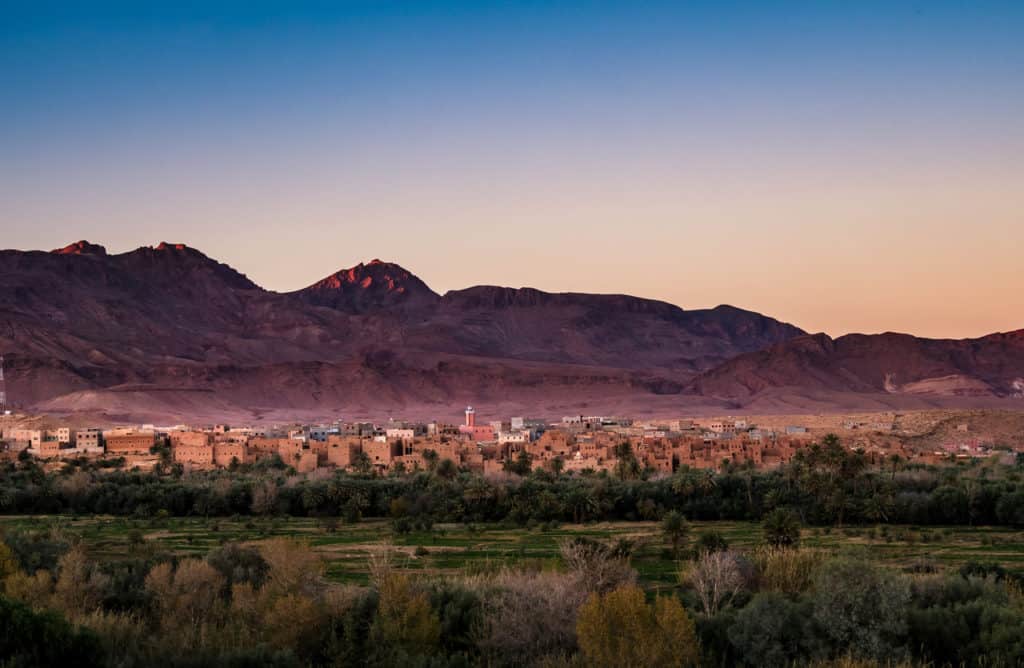
In rural areas, it will be much harder to find food stores open during the day…
5. How do Moroccans greet each other during Ramadan?
Moroccans will greet each other with the sentence Ramadan Mubarak to which they will usually answer with Ramadan Kareem.
People use polite expressions to wish each other a happy Ramadan. They can be used throughout the whole month of Ramadan and not necessarily only at the beginning.
If you travel to Morocco during that period, you should try using these expressions. Moroccans will love seeing that you’re putting effort into learning their language.
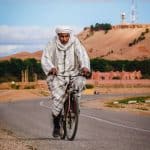
10 tips and tricks to learn Moroccan Arabic
6. How can you prepare for Ramadan in Morocco if you don’t want to fast?
Moroccans don’t usually expect foreigners to fast during Ramadan. Because of this, many snack stores will remain open from the afternoon until the evening.
Bakeries also stay open for people to be able to buy the bread and pastries they will eat with their meals after sunset.
My suggestion would be to get your breakfast already the evening before. Moroccans tend to go to bed very late during Ramadan so food stores stay open late at night, however, they don’t open before the late afternoon.
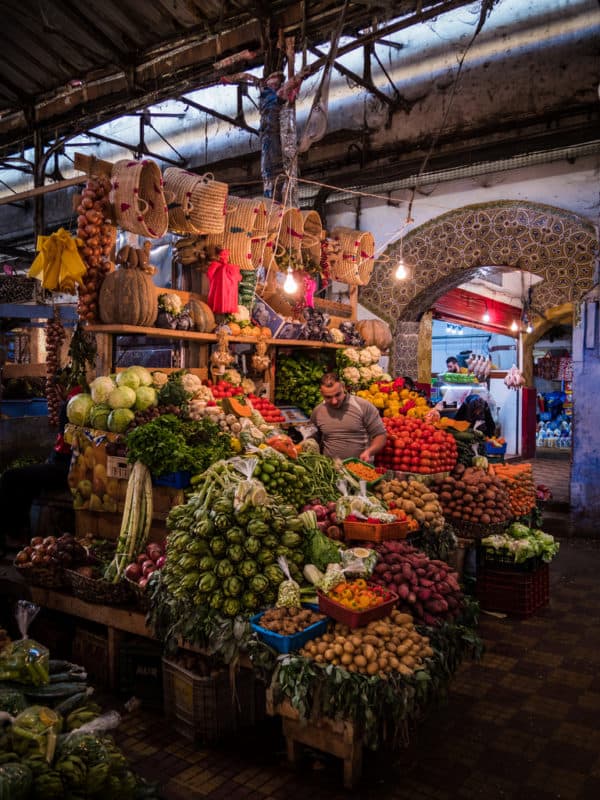
Fruit and vegetable markets stay open during the day in Ramadan…
It’s also going to be crucial to buy enough water ahead of time just in case you wouldn’t find any open stores.
It’s safe to drink tap water in Morocco but only if you know beforehand if the town or city properly filters its water. Although many major cities in Morocco have sound filtering systems, some still don’t.
Opt for bottled water or use a LifeStraw Water Filter Bottle to filter the tap water during your first days in Morocco as you don’t know how your body might react to the bacteria composition of the local water.

I hope you’ll enjoy your time in Morocco during Ramadan. Have you ever traveled to another Muslim country during Ramadan? How were your experiences? Would you recommend it or not?
Related posts

The Honest Guide to Meknes Morocco and Volubilis – 9 best things to do and what to skip
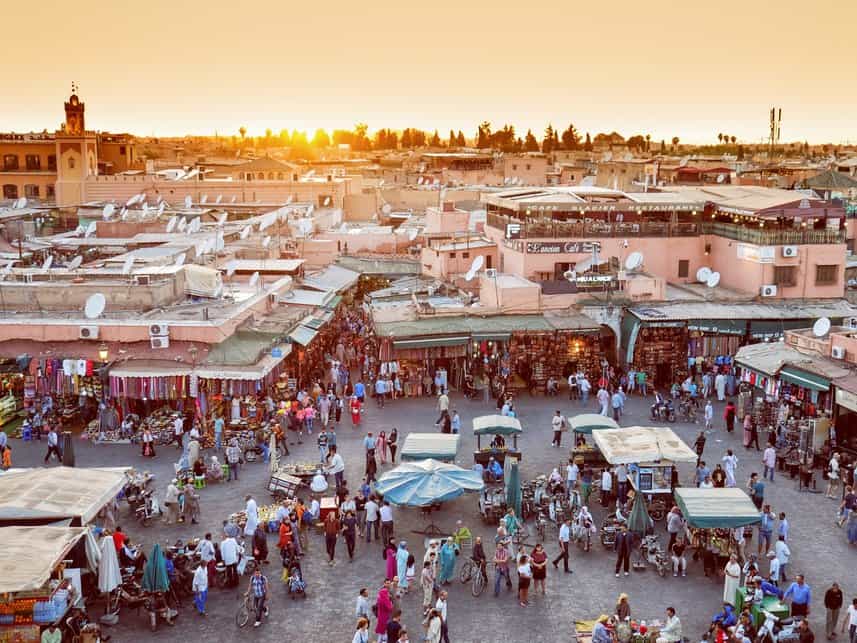
16 Top Things to do in Marrakech Morocco – The Complete Guide to Morocco’s Red City

11 Best Things to do in Rabat Morocco – The Complete Guide to Morocco’s Capital City

20 Top Things to Do in Tangier Morocco – The Complete City Guide

10 Best Things to Do in Agadir Morocco – The Complete Guide to Morocco’s Surf city

12 Best things to do in Chefchaouen, the Blue City of Morocco
7 thoughts on “how is it to travel during ramadan in morocco – 6 helpful tips”.
I will be spending Ramadan with my wife this year and forsee no problems. We have however traveled for 13 years now and are used to working within the customs of all countries. We spent the month of Ramadan in Istanbul a few years ago and it was no problem. Being a traveler like us means having to accept the customs and traditions of all countries and work withinthem.
Very interesting and informative text, thanks a lot! I will also check your other blog texts about Morocco. We will be travelling there this spring during Ramadan. We’re a group of 2 kids (3y and 6y) me and my husband plus my parents-in-law. We will be making a road trip Tangier, Chefchaouen, Fez, Meknes, Rabat, Marrakech and finally Casablanca. And funny thing is, that we also live in Belgium 🙂
Have a great time!!
I am currently in Morocco during Ramadan and I have to be honest, I would not recommend choosing this time to travel. There is a pronounced vibe change as Ramadan begins, with the mood/energy levels of Moroccans absolutely flagging during this time. People will insist that they love Ramadan, but experientially you’re going to see a lot of sullen faces and sunken eyes. The night is a different story, so if you’re a night owl you may enjoy it!
Hi Jelly, may I ask where you currently are in Morocco? Yes, it’s true, Ramadan isn’t always an easy time for people, and some deal better with it than others. Night time is indeed the best during Ramadan as everything becomes back to life 🙂 I hope you enjoy the rest of your trip!
I think Ramadan month will be the best way to travel in Morocco in order to study their culture and religious doctrine’s
Yes, I fully agree with you Ibrahim!
Leave a Comment Cancel Reply
Your email address will not be published. Required fields are marked *
Save my name, email, and website in this browser for the next time I comment.

Ramadan in Morocco: all you need to know for your travels
Ramadan in Morocco is a unique experience for travellers when the normal rhythm of life in Morocco stops. Travel during Ramadan in Morocco can become a special holiday.
Ramadan dates in Morocco in 2024: March 12 – April 10
What is Ramadan?
Ramadan is the 9th month in the Islamic lunar calendar, during which the Qur’an was revealed to the Prophet Muhammad. For Muslims, it is a month of fasting – eating, drinking, making love, and smoking is not allowed from sunrise to sunset. Fasting (Sawm) is one of the five pillars of Islam. Through fasting, Muslims restart their awareness of and gratitude for everything God has provided.
At the centre of Ramadan, there are spiritual things – praying more, helping the poor, thinking over one’s life and, of course, getting closer to Allah. Fasting seeks to show all Muslims what it means to be poor in a modern world where not everyone has something to eat.
Coming to Morocco? Book your consultation
Book your 45-minute 1:1 video consultation call, and I will answer all your questions about Morocco, review your itinerary or create one together.
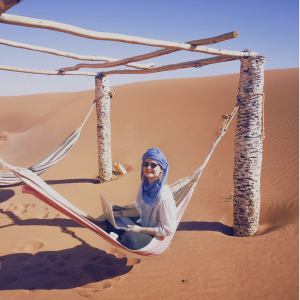
Fasting is optional for children under the age of 16, nursing mothers, pregnant women, the sick, women in their menstruation period, hard-working Muslims who would otherwise be unable to support their families, or travelling people. All those with justifiable reasons to eat during Ramadan may fast after Ramadan, thus redeeming their eating.
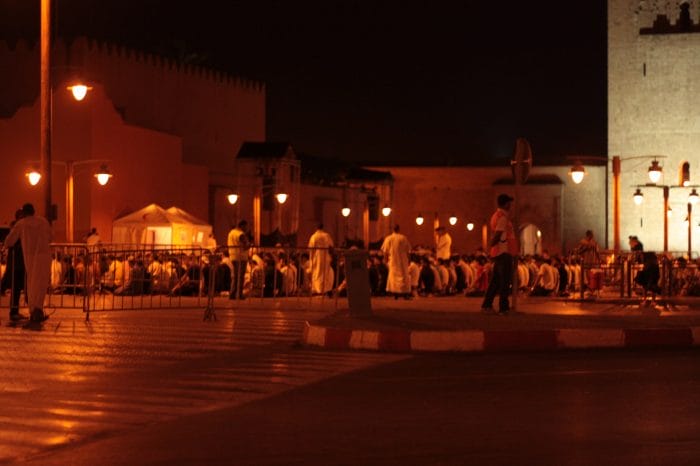
FASTING: IFTAR AND SUHOOR
During Ramadan, Muslims don’t eat or drink anything during daylight hours. There are two meals eaten at a specific time, and it’s useful to know about them if you travel to Morocco during Ramadan. Muslims eat one meal before dawn, the “predawn meal” or the ‘suhoor/sehri’ (around 4 am), and another after sunset, called the “iftar” or Ramadan breakfast (around 7 pm).
Most Muslim cultures focus on food during Ramadan, and especially the evening meal iftar is a big celebration for everyone. As the sunset approaches, most local restaurants open their doors wide, serving traditional iftar meals. Some people sit down in front of their food plates and endure the smell, patiently waiting for the prayers announcing the end of the day of Ramadan.
In Morocco, traditional Ramadan food is the Harira soup, eaten with boiled eggs, dates, Moroccan pancakes Msmen , yoghurt, milk, and sweets like Chebakia that is sold on every corner during Ramadan, but I find it too sweet for my taste.
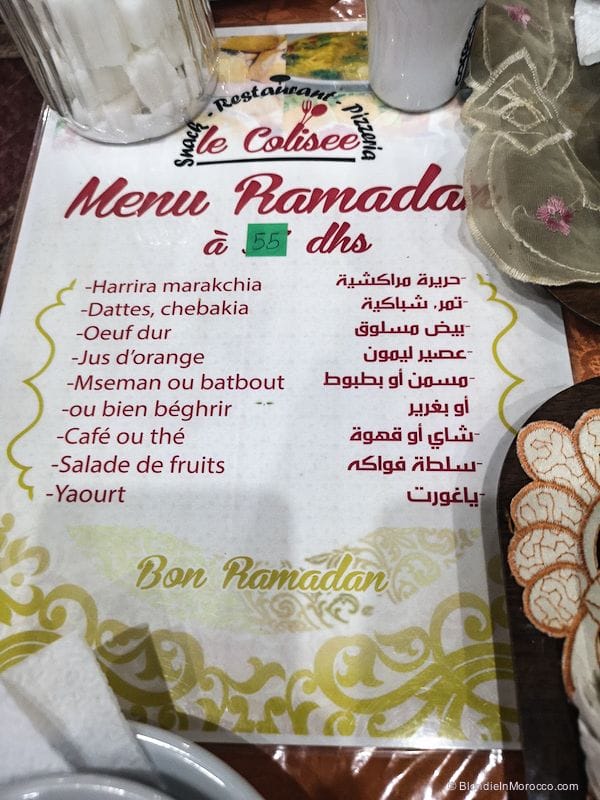
Even though I am not Muslim, I love going out for the Iftar meal. I would sit in the local restaurant and patiently wait for the signal to eat. And then, voilà, you hear the firing cannon, the whole city is instantly empty. Fasting Muslims are running home or to restaurants, and the cleverest ones immediately fill their stomachs with delicious food. So if you travel during Ramadan, don’t plan any dinner (only Iftar meal) or other activities from around 7 to 8 pm.
WHO ARE THESE FIRING SOUNDS?
During Ramadan, every evening, right before sunset, you will hear a loud noise. These booming sounds are called “Medfaa” (Midfa al iftar), the Cannon for breakfast, which signals the start of Ramadan and the end of each day’s fasting. The Cannon is an ancient tradition that started in Egypt and spread to several surrounding Arab countries.
Often, especially for the Iftar, instead of the cannon blasting, you will hear the sound of an air raid siren called Zowaka . I don’t hear the difference between Zowaka and Cannon sounds, so don’t get confused if you hear different namings.
Seven firings of cannon announce the start and the end of Ramadan. Then, every evening one cannon boom announces Iftar time, the breaking of the fast, followed by the call to prayer.
A second cannon firing is followed much later, in the early morning hours, around 4 am, during the call to Fajr prayers (the first of the five daily prayers). The firing of cannons wakes Muslims up for the Suhoor/Sehri meal. The third firing is when everyone should stop eating Suhoor meal, and go to sleep. Then, starts a new fasting day.
During Ramadan, at night, you might hear or even see (if you wake up early) a special person called Nafar (a town crier) with a traditional robe called gandora, slippers & a hat. Nafar’s task is to walk down the streets, blowing a horn and calling people to wake them up for suhoor , the pre-dawn meal.
LIFE DURING RAMADAN
During Ramadan, many shops are closed; if they are open, that is only in the evening. Of course, this does not apply to tourist shops and cafes, most of which are in Marrakesh’s Medina. It is better not to plan any significant work, like home reconstruction, during Ramadan because local workers will not find the strength to do it.
And that is no wonder, given that they give up food and water at the temperature of +45 degrees Celsius and get up before dawn for fajr prayer and an early breakfast.
LAYLAT AL-QADR
The last 10 days of Ramadan are the holiest days for Muslims because that is when the Prophet Muhammad received the first ayahs (verses of the Qur’an). The most significant night is called Laylat al-Qadr (Night of Power, Night of Destiny).
The surah (chapter of the Quran) states Laylat Al Qadr is better than 1,000 months, meaning the worship Muslims do on this night earns rewards of life. Which would translate into 83 years in modern time measurement. In the Quran, it is stated, “Whoever establishes the prayers on the night of Qadr out of sincere faith and hoping to attain Allah’s rewards then all his past sins will be forgiven”. That’s why in the last days of Ramadan, Muslims pray not only during the day but also during the night, until 5 am.
EID AL-FITR

The end of Ramadan is announced by the young moon appearing in the sky. Then begins the one celebration of Eid al-Fitr (also called the “Festival of Breaking the Fast”), during which everyone makes up for the month of fasting. In the main squares, there are free lunches or other kinds of help offered to the poor. Eid al-Fitr is one of the biggest Islamic holy festivals in the world.
This celebration begins early in the morning, just before sunset, when Muslim men gather for common prayer. At the same time, women prepare a special breakfast of Eid al-Fitr, which usually consists of Moroccan pancakes ( baghrir or melwi ). After breakfast, families gather together drink tea, children are dressed in new clothes, and adults wear traditional Moroccan clothing.
Up to 48 hours before the Eid al-Fitr prayer, Muslims must pay Zakat Al Fitr , a charity taken for the poor. In Morocco, the minimum amount of Zakat Al Fitr is fixed by the government, last year it was 13 DH per person (minimum).
TRAVELING TO MOROCCO DURING RAMADAN
It is said, “When in Rome, do as the Romans do”, so during Ramadan, try to keep local traditions as well
- most local cafes and restaurants close for the month of Ramadan. However, tourist restaurants and cafes are open at regular hours.;
- dinners in touristy restaurants will be served later, after the Ramadan iftar dinner; so either plan to eat around 8pm, or eat the Ramadan dinner together with locals.
- all tours, transfers, and tour guides are available during Ramadan, so don’t be afraid of being stuck in a hotel;
- local and intercity buses and trains run during Ramadan;
- in smaller Moroccan cities, most local cafes and restaurants will be closed and open only in the evening. So maybe arrange your lunch in advance. Usually, drivers know places that are open for tourists for lunch during Ramadan;
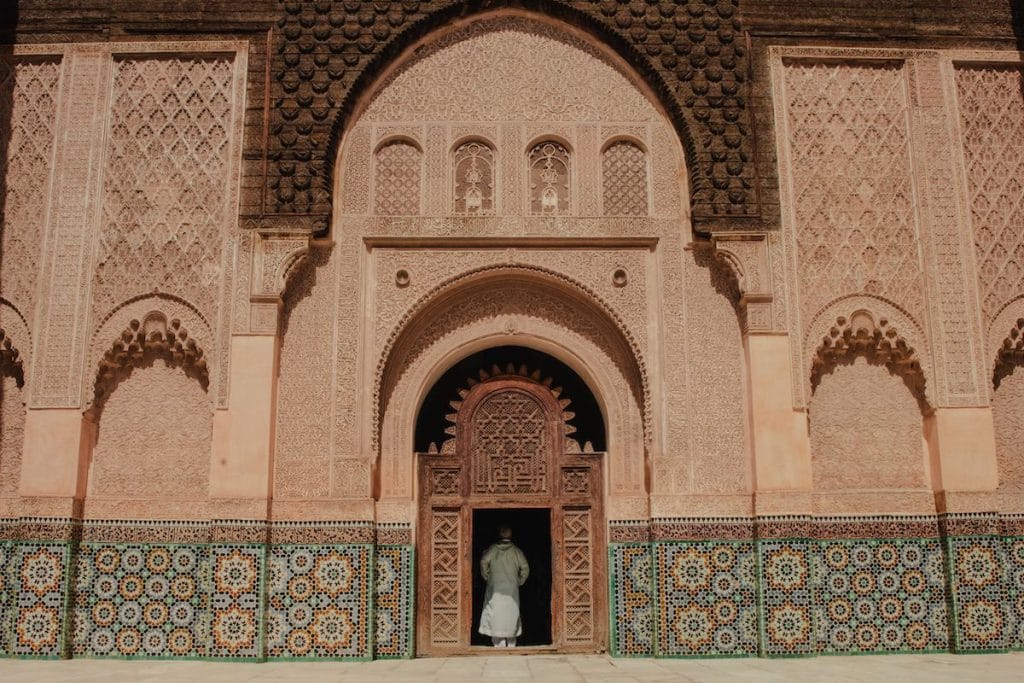
- a very important moment during Ramadan is the iftar breakfast, which starts at sunset. Because this is the first meal of the day for Muslims, everyone gathers in one place to eat. Once the iftar starts, you might have to wait for the cafe staff to finish their meals first. Tour drivers also try to drive to places before the start of the iftar;
- during Ramadan, alcohol is sold strictly to foreigners and non-Muslims ONLY. All liquor stores require you to show your passport (even foreigners) without exception. Muslims are not allowed in the bars during Ramadan, so many local bars are closed for the month.
Similar Posts
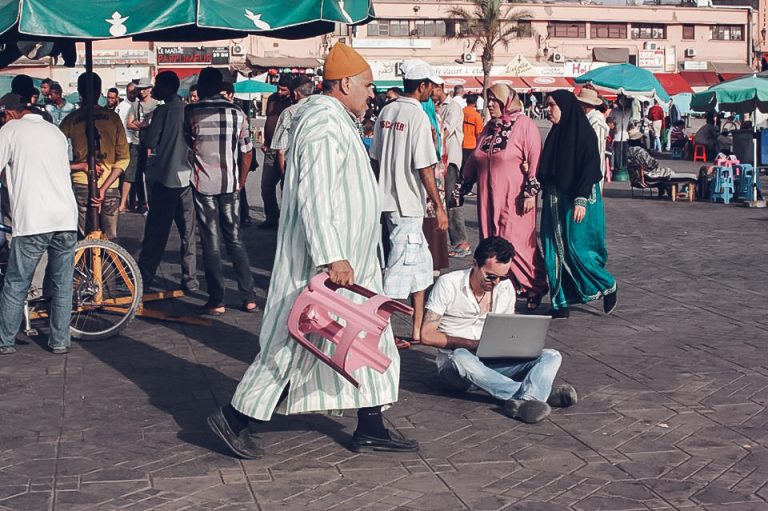
Stay Online in Morocco: SIM cards and Internet
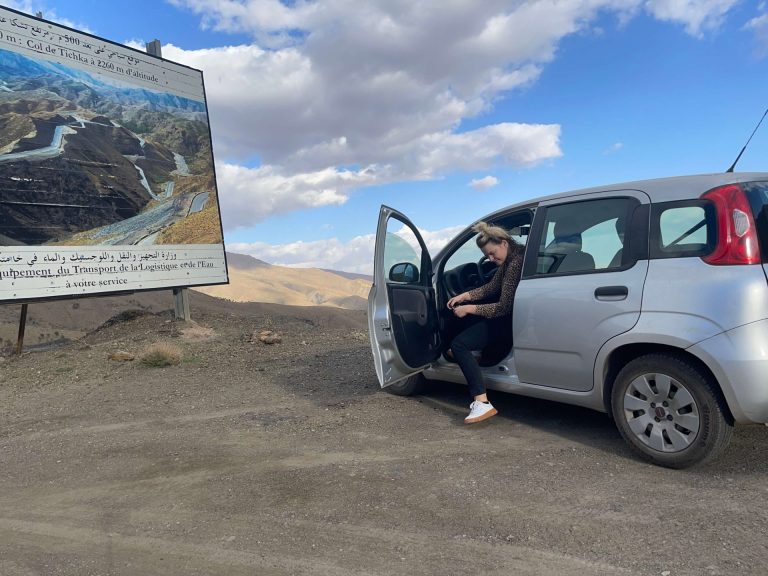
Rent a car in Morocco – shall you or shall not?
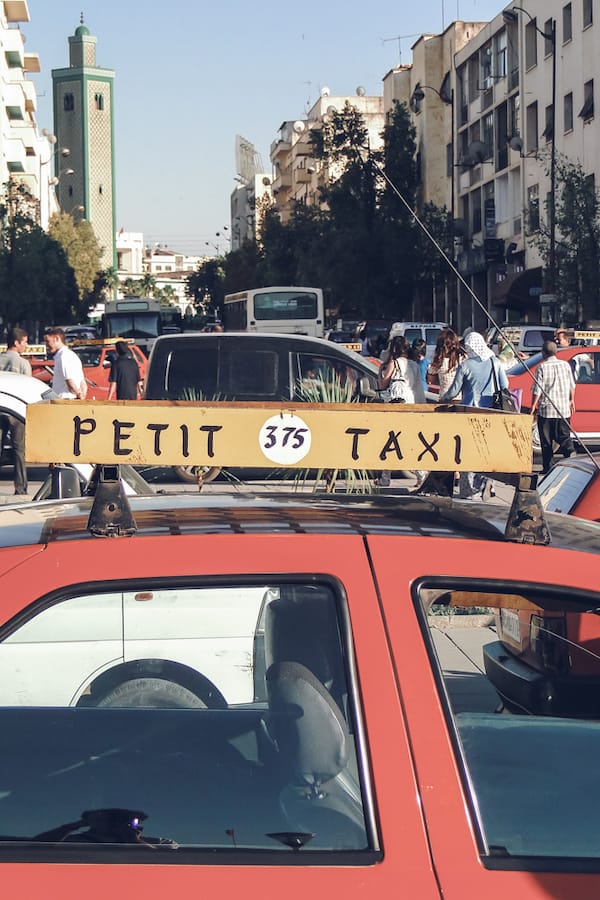
Taking taxi in Morocco: a survival guide
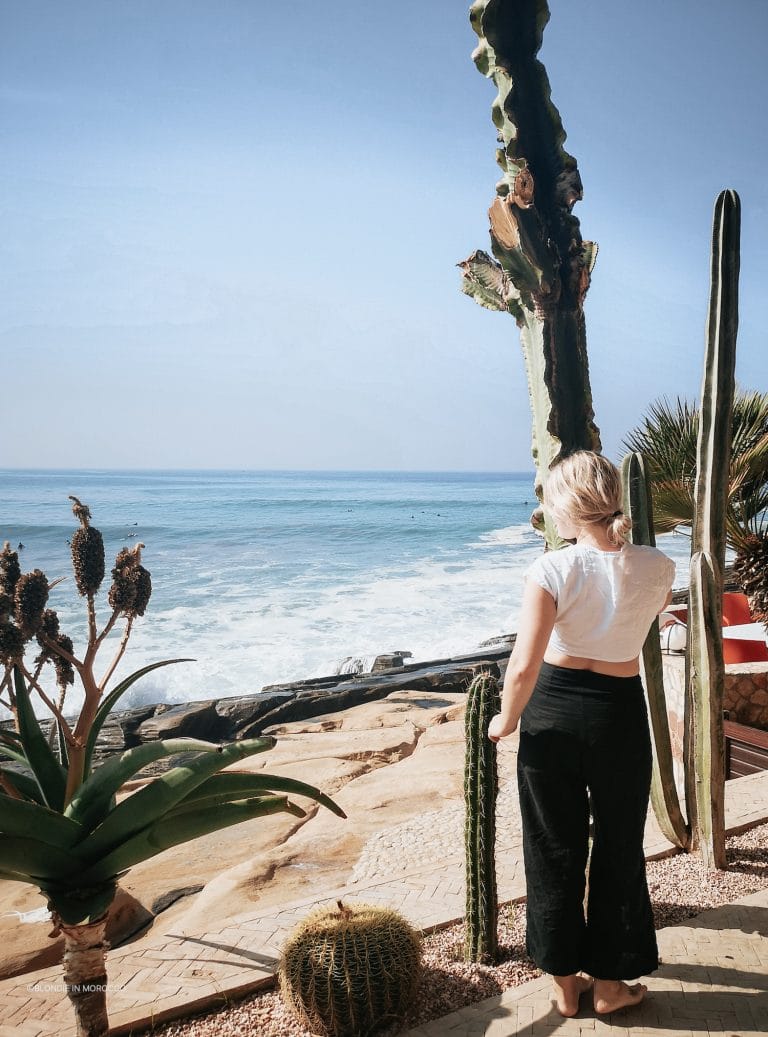
Weather in Morocco. When Is the Best Time to visit?
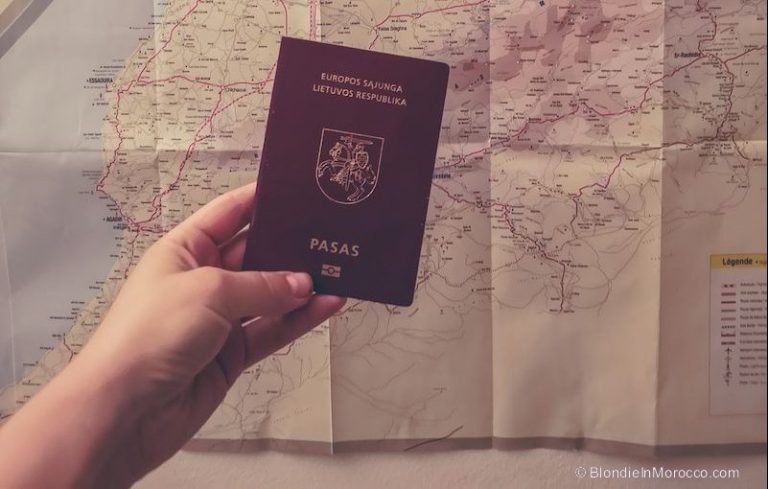
Morocco entry requirements: do you need a visa?

Marrakech’s Public Transport. Taxi vs City Bus
Leave a reply cancel reply.
Your email address will not be published. Required fields are marked *

5 Tips for Traveling in a Muslim-Majority Country During Ramadan
Daily life slows down a bit, but traveling to a muslim country during ramadan allows you to be charitable, meet gracious locals, and taste some seriously good food..
- Copy Link copied

Ramadan is observed March 10 to April 9, 2024.
Photo by Ishaq Madan
Ramadan, the Muslim holy month, is marked by fasting from sunrise to sunset, with days reserved for introspection and evenings for socializing with family and friends. Since Muslims follow the lunar calendar, Ramadan naturally falls 11 days earlier each year. In 2024, it is observed from March 10 to April 9. For non-Muslims traveling to Indonesia, Egypt , or another Muslim-majority country during Ramadan, follow this guide to get closer with the people, food, and culture during your travels.
1. Research the way Ramadan is celebrated
Ramadan is the ninth month of the Islamic calendar, during which it’s believed the Quran was revealed to the Prophet Muhammad. The Islamic calendar is lunar, so it shifts a bit each year as measured by the Gregorian calendar. While Ramadan is March 10 to April 9 this year, it will be from February 28 to March 30 in 2025. (Note that the exact dates can vary by a day or two, depending on when the new moon is sighted and how you determine “start” and “end.”)
How Ramadan is observed around the world varies, so travelers should research local laws and practices in advance. “Some countries are closed to visitors during Ramadan while others are more welcoming,” says Anissa Helou, cookbook author, teacher, and chef who specializes in Middle Eastern and Mediterranean cuisine. In some places, like in Dubai , eating and drinking in public during daylight hours is not allowed, whether you are observing the fast or not. In others, like Istanbul , it’s more tolerated. Check things like whether restaurants are open during the day and the availability of alcohol. Bear in mind that the time between sunrise and sunset is a lot longer during the summer.
Ramadan is also an ideal time to connect with local culture by supporting your host country. One of the best ways to learn about a region’s customs is by hiring a local guide. During Ramadan, guides can provide information on the traditional food and practices and ways to observe Ramadan as the locals do. Support those in need by cooking an iftar meal with Resala in Egypt, donating food or clothes to Ajialouna Organization in Lebanon, or contacting another established NGO to volunteer.
2. Respect the practices
Ramadan is a period of devotion, reflection, and charity. The most obvious manifestation of this will be the fast, which is one of the five pillars of Islam . People observing the fast will not eat, drink, or smoke between sunrise and sunset. Particularly devout practitioners may even avoid swallowing their own saliva.
As a visitor, you will not be expected to fast (though you may if you want). However, you should be mindful of consuming (or even displaying) food and drink in public during the day, regardless of your destination’s actual laws. It’s common-sense respect: If not a drop or morsel had passed your lips for hours, you wouldn’t want to have someone merrily guzzling right in your face. Watch what nonfasting locals do, and follow suit.
Many places, especially touristy ones or where there is a large nonobservant population, will have restaurants open and serving during the day, though they may not be flaunting it. Hotels often offer private dining options for visitors. Everywhere is different.
During Ramadan, Muslims will also try to avoid all forms of sinful behavior, such as evil thoughts or false speech. It’s therefore respectful to conduct yourself in a similarly restrained manner, moderating your language and behavior and dressing modestly: Long pants and a top that covers your shoulders (and midriff) will do the trick. Likewise, public intoxication is a no-no.
3. Relax, because business slows down
Many restaurants, government entities, and even some tourism sites operate on reduced hours or may be closed entirely during Ramadan. Don’t plan on getting much done just before or after sunset, when people break their fast with the evening meal, iftar. Before this, everything grinds to a halt as everyone is either at home or heading there (or to wherever else they are breaking their fast). And if you do need to go somewhere and are lucky enough to find a taxi, prepare for the ride of your life as the hangry driver speeds home to their family. Afterwards, everyone is in a blissful post-iftar food coma for a while. From a traveler’s point of view, all this is fine as long as you plan your day in advance.
4. Respond to iftar invitations
If all this sounds rather dour, think again. Sure, Ramadan is a time of sustained religiosity, and the fast is tough, but it’s also a time of intense joy, camaraderie, and affirmation. People often break their fast at communal public tables (sometimes provided by richer members of society for the poorer).
Although all are welcome to attend public iftars, it’s relatively common to be invited to a private iftar. “Being invited to share iftar in people’s homes is a sign of friendship and respect,” says Helou, and it allows you to experience this holy time in an intimate, authentic way. It doesn’t matter whether you’ve been fasting or not. There are plenty of savory dishes, sweet treats, and conversation to go around, and though visitors are not expected to bring a gift for the host, dates or desserts are a nice way to show your appreciation. At the end of the month, Eid al-Fitr breaks the monthlong fast with an elaborate feast, classy dress, and gift-giving.
5. Rejoice and get into the festive spirit
During Ramadan, nights are where the real action lies. Iftar acts like a pressure valve, and once people have broken the fast, the streets come alive. While some people spend time reading the Quran or praying at the mosque, others will visit family and friends and, of course, eat and drink some more. Sometimes, feasting lasts until the early morning. Where you are will determine how festive it feels, but there will usually be something going on. As a visitor, this is a wonderful time—and a privilege—to be out and about, soaking up the atmosphere and sharing a little of what makes this month so special to more than a billion people around the world.
This article originally appeared online in 2015; it was most recently updated on March 11, 2024, to include current information.

- Restaurants
- Hébergements
Que recherchez-vous ?

Venir durant le Ramadan à Marrakech : bonne ou mauvaise idée ?
Cette année, le Ramadan aura lieu aux alentours du 10 mars jusqu’au 11 avril 2024. (Cela peut varier à un jour près). Oui, c’est toujours intéressant de venir à Marrakech durant le Ramadan. Il fait environ 30 degrés durant cette période, soleil au rendez vous. Les prix des hôtels et des billets d’avion y sont moins élevés et il y a beaucoup moins de monde. Pas d’attente pour accéder aux musées et jardins.. le rêve !
Tout est ouvert la journée : activités, restaurants, piscines, etc mais les souks et boutiques ferment beaucoup plus tôt. Vous pouvez bien sûr manger dans les restaurants la journée.

Pour le coucher du soleil : la ville se vide et tous les marocains vont manger pour ressortir ensuite. En général, les repas de rupture du jeûne (f’tour) se font en famille mais d’excellents restaurants proposent des buffets ou menu « f’tour » durant le ramadan. Bien évidement, même les non musulmans peuvent venir y dîner. Nous vous proposerons peu avant le ramadan, une catégorie pour retrouver tous les « f’tours ».
La ville vit énormément la nuit durant le Ramadan, quasiment tous les commerces sont ouverts. D’ailleurs, on y fait aussi beaucoup moins la fête. Les établissements festifs sont moins bondés que d’habitude. Le Ramadan ne devrait pas vous freiner pour visiter Marrakech même si il y moins d’ambiance que d’habitude.

Voyager en train en Turquie : Les différents trajets + Prix
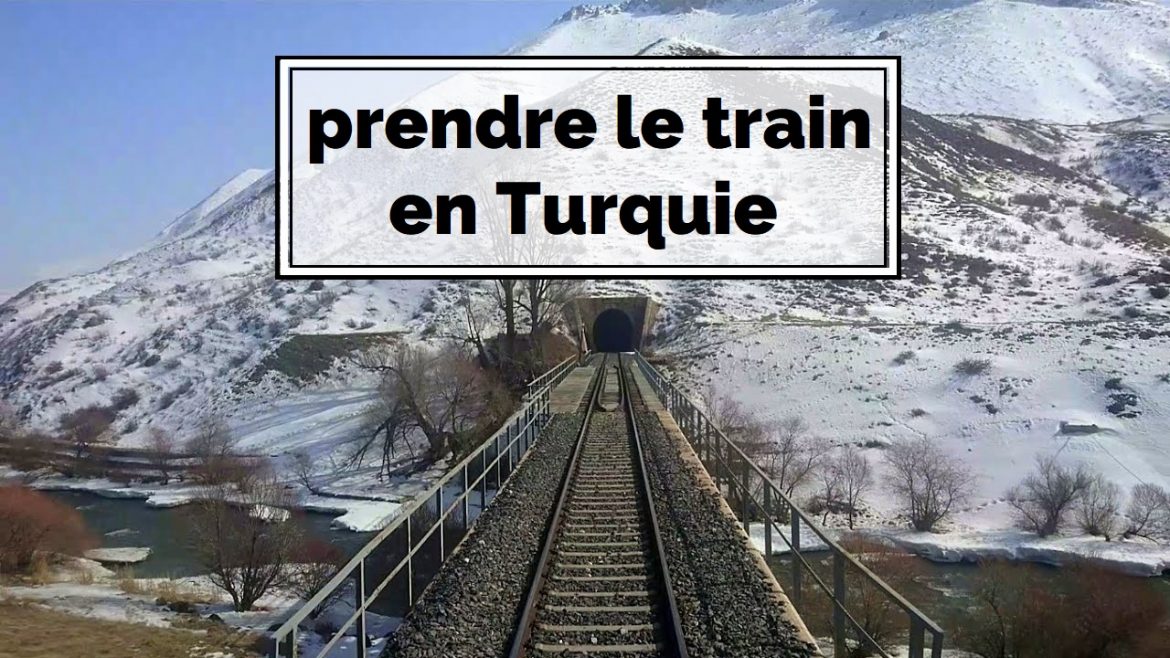
Afin d’exploiter tous les merveilleux paysages de la Turquie , il existe plusieurs options de transport autres que l’avion. Je vous ai déjà parlé des voyages en bus en Turquie que j’adore. Dans cet article, nous allons exploré les différents trajets possibles en train en Turquie.
Le TGV se dit Hizli Tren en turc, et on trouve près d’une vingtaine de lignes disponibles à travers la Turquie entière.
Si vous avez un compte Instagram , vous avez surement vu les voyages magnifiques dans le Dogu Ekspres . Or ce trajet coûte aujourd’hui autour de 150 € par personne.
Trouvez donc ci-dessous d’autres voyages en train disponibles en Turquie et qui valent le détour tout autant que le Dogu Ekspres (je vous mets tout même aussi les infos pour celui-ci si vous avez le budget).
PS : Les prix datent de 2022, ils seront mis à jour dès le début de l’année 2023.
Liste des trains depuis Istanbul
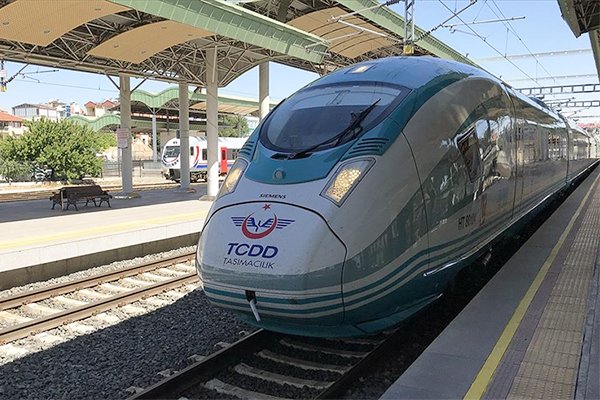
- Hizli Tren ISTANBUL – ESKISEHIR → 10 trains par jour, 2h30 de trajet, 146 TL l’aller
- Hizli Tren ISTANBUL – ANKARA → 6 à 7 trains par jour, 4h de trajet, 217 TL l’aller
- Hizli Tren ISTANBUL – KONYA → 3 trains par jour, 4h30 de trajet, 260 TL l’aller
- Sofya Ekspresi ISTANBUL – SOFIA – BUCAREST → 1 train par jour, 9h de trajet, entre 30 € l’aller pour Sofia, jusqu’à 65 € avec couchette – 50 € l’aller pour Bucarest.
Liste des trains depuis Ankara
- Dogu Ekspresi ANKARA – KARS → 1 train par jour, 24h de trajet, 3000 TL l’aller avec couchette
- Vangölu Ekspresi ANKARA – TATVAN → 1 train par jour, 26h de trajet, 500 TL l’aller
- Güney Kurtalan Ekspresi ANKARA – DIYARBAKIR→ 1 train par jour, 24h de trajet, 300 TL l’aller
- Hizli Tren ANKARA – ESKISEHIR → 12 trains par jour, 1h30 de trajet, 84 TL l’aller
- Hizli Tren ANKARA – KONYA → 7 trains par jour, 2h de trajet, 87 TL l’aller
- Cukurova Mavi Tren ANKARA – ADANA → 1 train par jour, 9h de trajet, 50 TL l’aller
Liste des trains depuis Izmir
- Izmir Mavi Tren IZMIR – ESKISEHIR → 10 trains par jour, 1h50 de trajet, 42 TL l’aller
- Konya Mavi tren IZMIR – KONYA → 1 train par jour, 12h de trajet, 57 TL l’aller
- 6 Eylül Ekspresi IZMIR – BALIKESIR – BANDIRMA → 1 train par jour, 5h de trajet, 59 TL l’aller
Liste des trains entre d'autres villes turques
- Pamukkale Ekspresi ESKISEHIR – DENIZLI → 1 train par jour, 8h de trajet, 135 TL l’aller
- Hizli Tren ESKISEHIR – KONYA → 3 trains par jour, 1h45 de trajet, 110 TL l’aller
- Toros Ekspresi ADANA – KONYA → 1 train par jour, 5h50 de trajet, 50 TL l’aller
- Firat Ekspresi ADANA – MALATYA – ELAZIG → 1 train par jour, 9h30 de trajet, 74 TL l’aller
- Erciyes Ekspresi ADANA – KAYSERI → 1 train par jour, 5h de trajet, 46 TL l’aller
J’ai surligné en rouge les trois trains les plus populaires du moment, avec des paysages incroyables que vous pouvez voir sur Instagram.
Comment réserver un billet de train en Turquie ?
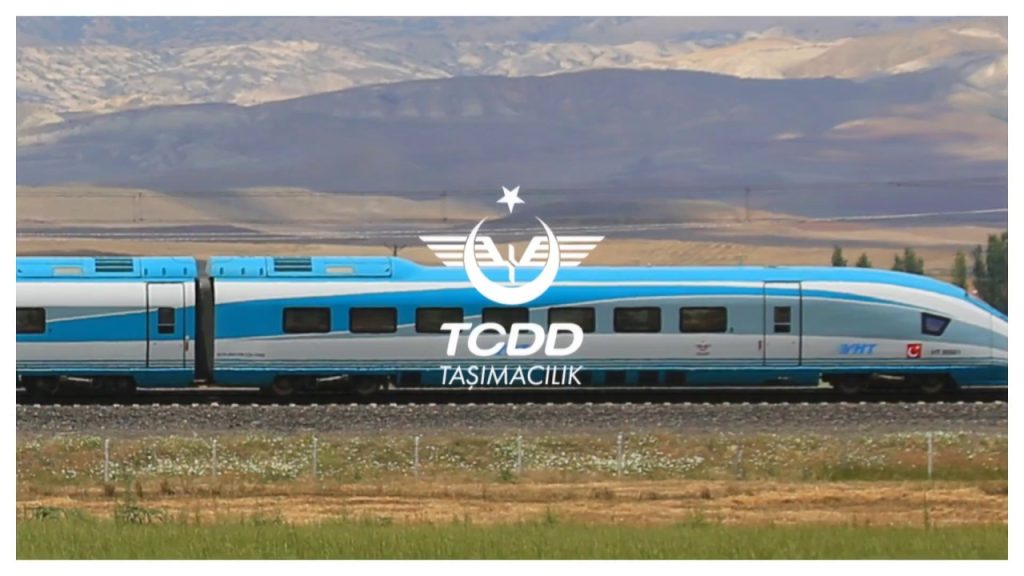
La compagnie publique de voie ferrée turque est la TCDD Tasimacilik AS Genel Mudurludu.
Elle liste tous les trains sur son site internet (disponible uniquement en turc malheureusement). Vous pouvez acheter vos billets sur ce site officiel de manière sécurisée.
- Le site de la TCCC avec liste de tous les trains
- Lien direct de la boutique en ligne pour réservation
Vous pouvez également les appeler depuis une ligne turque pour réserver ou demander des informations au numéro suivant : 444 8233
Les cartes pass spéciales pour voyager train en Turquie et autour
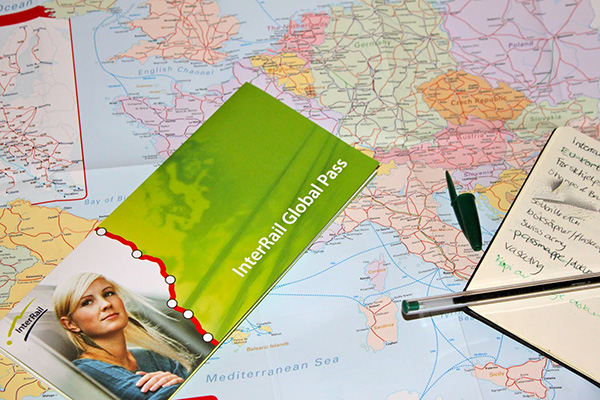
Il existe des Pass spéciaux pour voyager en train en Turquie ou dans les pays limitrophes depuis la Turquie. Voici la liste des pass de train disponibles :
- Interrail Global Pass : Valable pendant 4, 5, 7, 10 ou 15 jours sur une période de validité d’un mois ou deux mois.
- Interrail One Country Pass : Disponible sur 30 chemins de fer nationaux qui participant à ce service d’Interrail pendant 3, 4, 5, 6 ou 8 jours sur une période de validité d’un mois.
- Flexipass Pays Balkans : Valable sur les chemins de fer des pays suivants : Bulgarie, Macédoine, Grèce, Serbie, Monténégro, Bosnie-Hezégovine, Roumanie, Italie, Turquie.
Pour avoir plus d’informations sur les tarifs de ces cartes, cliquez sur le site officiel ici.
N’hésitez pas à me suivre sur Instagram si vous voulez des nouvelles fraiches de mes déplacements (réguliers, je dois l’avouer) dans la Turquie.
Qu’en pensez-vous, cela vous tente de prendre un train longue distance en Turquie?
D’autres articles du même style :
- Guide des 2 aéroports d’Istanbul
- Guide du nouvel aéroport d’Istanbul (infos et transferts)
- Les transferts aéroport-hôtel à Istanbul
- Comment prendre le bus en Turquie
- Les différentes croisières sur le Bosphore
- Les différentes cartes PASS touristiques en Turquie
- La Carte PASS de musées en Turquie
Passionnée d'écriture et de partage, en 10 ans, j'ai écrit 9 guides touristiques et historiques sur la ville d'Istanbul en parallèle de ma carrière de digitale marketeuse. Je suis toujours à l'affût de deux choses : un bon plan et une bonne histoire à raconter ! IG : @ blogistanbul
10 Choses à faire à Istanbul en Décembre ? (Nouvel an, Noël, météo…)
Les signes astrologiques en turc [+ phonétique et dates], you may also like, 19 meilleures séries turques netflix en 2024, cartes sim turquie [2024]: quoi acheter esim ou..., liste des meilleures cliniques en turquie | greffe..., 3 cartes de réduction touristiques à avoir à..., dire bonjour en turc : 4 manières différentes..., istanbul pendant le ramadan : magasins, musées et..., robe de mariée à istanbul: boutiques, fournisseurs, prix,..., liste des 25 meilleures choses à faire à..., 10 meilleures excursions au départ d’istanbul [1,2 ou..., liste des 14 meilleurs films turcs netflix en....
C'est une super idée, mais ça ne craint pas le train vers Van ou Kars?
Ton article tombe très bien; J'avais mis dans mes objectifs voyages 2018 🙂 J'ai fais la Turquie en voiture, en car, en avion et toujours pas en train! On se croisera peut être sur les routes ? 🙂
C'est la question que je me pose également mais il me semble que ca va pas trop mal.. C'est même devenu assez touristique grâce à ces trains…
Ah super, donc j'avais raison, ça devient populaire de prendre le train en Turquie 🙂 J'ai pour objectif de prendre le van ou dogu, vers septembre je pense.. Si tu veux te joindre à moi, avec plaisir 🙂
Bonjour Pelin,
Merci pour le blog. Après avoir fait un voyage un peu fou l'été dernier en famille (Lyon,Berlin, Varsovie, Cracovie, Prague, Vienne, Budapest, Zagreb, Ljubjanja, Zurich, Lyon), j'ai encore plus ambitieux. Lyon => Bakou en train, la partie européenne est assez simple mais c'est un peu flou pour la partie asiatique. Aurais-tu des infos concernant, les trajets Istanbul-Ankara, Ankara-Kars, Kars-Tbilissi-Bakou) ? Notamment la nouvelle ligne Kars-Tbilissi-Bakou ? Je ne parle pas le Turque et je ne comprends pas grand chose sur le site des chemins de fer Turques.
Merci d'avance pour d'éventuelles info,
Amicalement,
Et ça te dit en juin,? J’y serai et après avoir lu ton article, j’ai Envie de le faire
Un jour, sans vous y attendre, après une dispute, d'un ras-le-bol général, votre partenaire vous quitte. Le ciel vous tombe sur la tête, le bonheur laisse tout à coup place à la douleur, puis cette question qui reviens en boucle : Que faire maintenant? Afin de vous aider à vous reconstruire au plus vite, nous vous guiderons, étape par étape afin que vous puissiez raviver la flamme chez votre partenaire.mais comme le malheur ne prévient pas,voici quelques solutions du puissant Maitre medium Marabout papa Santos pour vous aider à retrouver votre sourire en cas de problèmes d'amour,retour d'affection,attirance et autres…
les rituels d'amour et de retour d'affection du maitre medium voyant puissant marabout dahvaudou Santos * Retour de l' être aimé * Rapprochement affectif * Retour Affectif Rapide* Magie rouge, Magie blanche, Magie noire pour l'amour * Jeter un sort pour le retour de l'amour perdu * Médium Marabout, rencontrer l'amour * Maitre spécialiste de l'amour * Envoutement, desenvoutement d'amour * Retour d'affection rapide*
Visitez son site web : https://www.rituel-de-retour-affectif-rapide.com ou faite moi parvenir votre demande par e-mail : [email protected] N'oubliez jamais que cette personne à été à un moment amoureuse de vous, ce qui signifie qu'il est toujours possible de faire renaître la flamme. Alors ne laissez pas les choses se dégrader à cause d’une dispute, d’une mauvaise passe, ou comme bien souvent à cause d’un mal entendu. Je suis aussi joignable sur Whatsapp au numéro : +22 99 74 58 500 Vous devrez faire un travail sur vous-même et ce n'est qu'en mettant en pratique ses conseils que vous réussirez à atteindre vos objectifs.
Contact Maître SANTOS : SiteWeb : https://www.marabout-vaudou-occulte.com SiteWeb : https://www.rituel-de-retour-affectif-rapide.com SiteWeb : https://www.retour-affectif-ex.wixsite.com/marabout-vaudou SiteWeb : http://www.sorcier-vaudou.onlc.be Blog : http://www.magieretouraffectif.unblog.fr E-Mail : [email protected] Tél Bénin :+229 974 585 00 (Joignable aussi sur Whatsapp) ======================================================================== Je suis a votre disposition pour vous aidez a résoudre tous ces problèmes, même les cas les plus désespère : Amour, protection contre les ennemies et les mauvais sorts, guérit l’impuissance, fidélité absolue (affection retrouvé). Fait venir ou revenir la personne que vous aimez, complexe physique et moraux, retour d'affectif rapide, attraction de la clientèle pour les vendeurs, chance dans tous les domaines, réussite dans les affaires, examens, retour affectif, concours et timidité, etc…. Vous pouvez me contactez par ces informations suivante :
Contact Maître SANTOS : SiteWeb : https://www.marabout-vaudou-occulte.com SiteWeb : https://www.rituel-de-retour-affectif-rapide.com SiteWeb : https://www.retour-affectif-ex.wixsite.com/marabout-vaudou SiteWeb : http://www.sorcier-vaudou.onlc.be Blog : http://www.magieretouraffectif.unblog.fr E-Mail : [email protected] Tél Bénin :+229 974 585 00 (Joignable aussi sur Whatsapp)
LAISSER UN COMMENTAIRE Cancel Reply
Save my name, email, and website in this browser for the next time I comment.
- À Sultanahmet
- Proche de l'Aéroport
- Pour Lune de Miel
- Pour les Groupes
- Avec Piscine
- Chambres Vue du Bosphore
- Avec Rooftop
- Avec Parc Aquatique
- Appartements à Louer
- TOP 10 Sultanahmet
- Show Derviches
- Avec les enfants
- Plus Belles Mosquées
- Plus Belles Églises
- Palais Ottomans
- Le Palais de Topkapi
- Le Palais Dolmabahçe
- La Mosquée Sainte Sophie
- La Mosquée Bleue
- La Citerne Basilique
- La Tour de Léandre
- Sultanahmet
1ère VISITE
RÉSERVEZ EN LIGNE
DEPUIS 2011, CHAQUE ANNÉE...
… des millions de lecteurs tombent amoureux d’Istanbul à cause de ce blog ♥

IMAGES
VIDEO
COMMENTS
Le musulman qui entreprend un voyage au cours du mois de Ramadan est autorisé à ne pas jeûner pourvu qu'il rattrape plus tard les jours de jeûne ratés Qu'il ait entamé le voyage avant le mois de Ramadan ou pendant celui-ci il bénéficie de cette autorisation car Allah exalté soit-Il dit sens du verset « Et quiconque est malade ou en voyage alors qu'il jeûne un nombre égal d ...
Allah a autorisé de rompre le jeûne en voyage. Dans le Coran, Allah à permis de rompre le jeûne quand on est en voyage. "Donc, quiconque d'entre vous est malade, ou en voyage, alors, il jeune un nombre égal d'autres jours". (Coran: 2:185) Dans ce passage du Coran, Allah nous informe que le jeûne du mois de ramadan est une ...
a)Abou Darda dit : Nous sortimes en compagnie du Messager d'Allah au cours du mois de Ramadan, à un moment où il régnait une chaleur si intense que l'un de nous se mettait la main sur la tête pour se protéger.Aucun de nous n'observait le jeûne hormis le Messager d'Allah (bénédiction et salut soient sur lui) et Abd Allah ibn Rawaha.
Dans le hadith, il est déclaré : Alors, il ne faut pas rater le jeûne du Ramadan, s'il n'y a pas une excuse. Il est permis, pour celui qui a une excuse validée par la religion, de rater le jeûne et de le rattraper par après. Si, au cours du voyage, apparaît une difficulté, si le travail se désorganisera ou s'il apparaît un cas ...
Vous devez porter ce que vous pensez devoir porter dans votre pays de destination d'après vos recherches, car les musulmans n'adoptent pas de changements vestimentaires spécifiques lors du ramadan. Toutefois, certains peuvent choisir de s'habiller plus sobrement en raison de l'esprit pieux qu'ils adopteront au cours du mois.
Près de 70 % des cinq millions de musulmans de France déclarent observer ce rite du jeûne. À l'étranger, en fonction des pays, le ramadan est plus ou moins scrupuleusement respecté.
Mais si le jeûne en voyage lui pose problème, il a le droit de ne pas jeûner. Par exemple, si on voyage en avion, et qu'il n'y a aucune fatigue, mais que l'idée de rattraper un jour de jeûne est problématique car on n'est pas habitué à jeûner en dehors du Ramadan, il vaut mieux jeûner malgré le voyage. C'est mieux pour ce ...
Oleg Breslavtsev - stock.adobe.com. DÉCRYPTAGE - Ce 11 mars commence le mois de ramadan, une période de jeûne et de prière pour les musulmans du monde entier. Entre promotions hôtelières ...
The month of Ramadan is when the Qur'an was revealed, giving guidance to humanity, clear messages of guidance and a standard for distinguishing right from wrong. Whoever lives to see this month should fast. Whoever is sick or travelling should fast on alternate days. God wants it to be easy for you, not hard, so you can complete the days you ...
Travelling during Ramadan. Ramadan is the 9th and holiest month in the Islamic calendar and lasts 29-30 days. Muslims fast every day for its duration and most restaurants will be closed until the fast breaks at dusk. Nothing (including water and cigarettes) is supposed to pass through the lips from dawn to sunset.
Turkey and Indonesia are also majority-Muslim countries, but neither is as strict as Arab countries during Ramadan. In large Turkish cities, you'll see business operating as usual, and, in the words of an Istanbul-born and based friend of mine, food and alcohol will be "as easy to find as bubble gum." In smaller eastern cities, however, alcohol ...
Voyager pendant le ramadan. Voyage et Ramadan. Si vous comptez partir pendant le mois du Ramadan dans un pays musulman, sachez que pendant cette période, la vie est transformée, les horaires ...
Janab Mufti Saheb ASAK. If we are travelling during RAMAZAN month (from one country to other country), will we make Roza as Qaza after Ramazan, aur it is Muaaf. wassalam. Answer. (Fatwa: 1435/1435/M=1431) No, it will not be exempted, it is necessary to make qaza of the missed fasts after the month of Ramadan. Allah (Subhana Wa Ta'ala) knows Best.
With night effectively turning to day, if you do intend to travel to a Muslim-majority place during Ramadan, do what the locals do. Sleep in the early part of the day and stay up late into the ...
Chaque année pendant un mois (dates variables), tous les musulmans observent le jeûne du ramadan qui correspond au neuvième mois de l'année lunaire, adoptée par la chronologie islamique.
With Ramadan generally meaning a wind-down all over the Muslim world, you might expect that the red city of Marrakesh shuts up shop for the month, but that isn't exactly the case. While the holy month means that many in Muslim-majority Morocco will be fasting during daylight hours, that doesn't mean that Marrakesh is in any way off limits ...
A lot of restaurants and food stalls are closed during Ramadan…. The best and easiest way is to eat and drink in the privacy of your hotel room in the daytime. The same goes for smoking. Foreigners shouldn't have any problem if they smoke within the compound of their accommodation in Morocco.
FASTING: IFTAR AND SUHOOR. During Ramadan, Muslims don't eat or drink anything during daylight hours. There are two meals eaten at a specific time, and it's useful to know about them if you travel to Morocco during Ramadan. Muslims eat one meal before dawn, the "predawn meal" or the 'suhoor/sehri' (around 4 am), and another after ...
Ramadan is observed March 10 to April 9, 2024. Ramadan, the Muslim holy month, is marked by fasting from sunrise to sunset, with days reserved for introspection and evenings for socializing with family and friends. Since Muslims follow the lunar calendar, Ramadan naturally falls 11 days earlier each year. In 2024, it is observed from March 10 ...
Oui, c'est toujours intéressant de venir à Marrakech durant le Ramadan. Il fait environ 30 degrés durant cette période, soleil au rendez vous. Les prix des hôtels et des billets d'avion y sont moins élevés et il y a beaucoup moins de monde. Pas d'attente pour accéder aux musées et jardins.. le rêve !
2 Van Lake Express. Ce train bihebdomadaire est très prisé des ferrovipathes en Turquie. Le Van Lake Express, qui relie Ankara à Tatvan en presque 25 heures, offre un parcours très pittoresque ...
Liste des trains depuis Ankara. Dogu Ekspresi ANKARA - KARS → 1 train par jour, 24h de trajet, 3000 TL l'aller avec couchette. Vangölu Ekspresi ANKARA - TATVAN → 1 train par jour, 26h de trajet, 500 TL l'aller. Güney Kurtalan Ekspresi ANKARA - DIYARBAKIR→ 1 train par jour, 24h de trajet, 300 TL l'aller.